- Hold down
Ctrlkey and select the sections you want to print. If using a Mac, hold down theCmdkey. - Use
Ctrl + Aor on Mac,Cmd + Ato select all sections (if you are using the Chrome browser). - Click "Apply" and the site will customise your print guide in the preview below.
- Click the "Print" button and a print pop up should appear to print to your printer of choice.
Articles about Vietnam
Pros and cons of moving to Vietnam
Vietnam is a popular travel destination with a range of attractions and pull factors luring both tourists and foreign nationals looking to work and live in the country. From the diverse natural scenery of tropical beaches, caves and rivers to the cosmopolitan city lifestyle, there’s a lot on offer.
Understanding the pros and cons of living in Vietnam is crucial before making the move, although you may also realise some surprising benefits and drawbacks after arriving.
At the end of the day, much of your experience will be determined by your willingness to adapt to your new environment and your perceptions and responses to both the good and the bad. To help you in your decision-making process, here is a selection of the pros and cons of moving to Vietnam.
Cost of living in Vietnam
+ PRO: Affordable cost of living
One of the biggest draw factors making Vietnam a popular destination is its low cost of living. The different currency (Vietnamese Dong) may take some getting used to, and the large denominations may make it seem like enormous amounts are being spent, but most goods and services are cheap. Beer and local wine are especially affordable, and low rental costs are also welcoming when searching for accommodation.
- CON: Increased prices and scams in tourist areas
New arrivals should be aware of the touristy areas in the large cities of Hanoi and Ho Chi Minh City. Although goods in these areas may initially appear cheap, tourists are often charged higher prices than a Vietnamese local would be for the same product or service. We recommend shopping around with a local to get familiar with fair prices and being aware of tourist scams to avoid losing money.
- CON: Imported goods and Western products are expensive
While local Vietnamese products remain affordable, imported goods and familiar Western brands come with hefty price tags. Items like cheese, Western cereals, international cosmetics, and electronics can cost as much as or more than they would back home. This means you’ll need to adapt your shopping habits and embrace local alternatives to keep costs down.
Cost of Living in Vietnam
Banking, Money and Taxes in Vietnam
Transport and driving in Vietnam
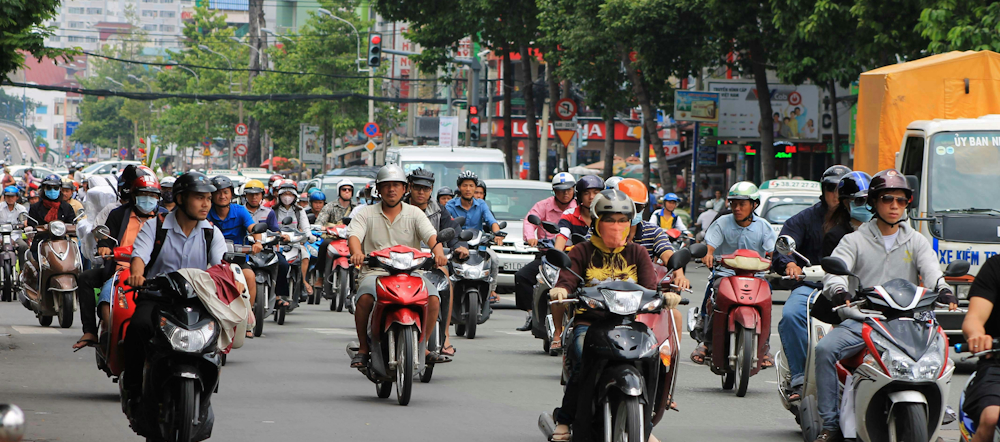
+ PRO: Many transport options
There are many options for getting around, especially in Vietnam’s major cities, and buses and trains allow easy travel around the country. The most common mode of transport in Vietnam is the motorbike. Many people report that it’s easy to rent a motorcycle – the challenge is riding it in the chaotic traffic.
Modern metro systems now operate in both Hanoi and Ho Chi Minh City, while ride-hailing apps like Grab offer convenient alternatives to traditional taxis.
+ PRO: Convenient and easy to travel to other Southeast Asian countries
If you have an urge to travel, you’ll find Vietnam to be a great base country from which to live and travel to other destinations. Affordable airline tickets can be found, and the country is home to several international airports, including Noi Bai International Airport and Tan Son Nhat International Airport.
- CON: Serious safety risks
Most forms of getting around have safety implications, but motorbikes pose particular dangers. 90 percent of Vietnam’s traffic fatalities involve motorbikes, with accident rates four times higher than with cars. Rules of the road appear non-existent, and drivers must be vigilant of all obstacles, including other vehicles and pedestrians. Motorbikes are everywhere, including the pavements, and in busy traffic, crossing the road and even walking on the pavement prove to be daunting tasks.
New traffic laws implemented in 2025 aim to improve the situation, but traffic safety is an ongoing concern.
Transport and Driving in Vietnam
Safety in Vietnam
Working in Vietnam
+ PRO: Easy to find a job
For global nomads and travellers, finding a job in Vietnam can prove easy, especially in teaching. Teachers are in high demand in Vietnam, with competitive salaries that have grown significantly as the market has recovered post-pandemic. Teachers can quickly find well-paid positions after arriving in Vietnam through social media and networking, although finding employment before arriving has its benefits too. Teaching English as a foreign language remains popular, but there are also opportunities in other sectors like technology, hospitality, and business services.
- CON: Applying for visas and work permits is complicated
Many applicants struggle with the paperwork when applying for visas and work permits for Vietnam. Recent regulatory changes have added extra steps to the process, and work permits are now valid for a maximum of two years with a possible extension. The process requires extensive document authentication and can be subject to change, which adds to the confusion.
Finding a Job in Vietnam
Visas for Vietnam
Work Permits for Vietnam
Culture shock and lifestyle in Vietnam
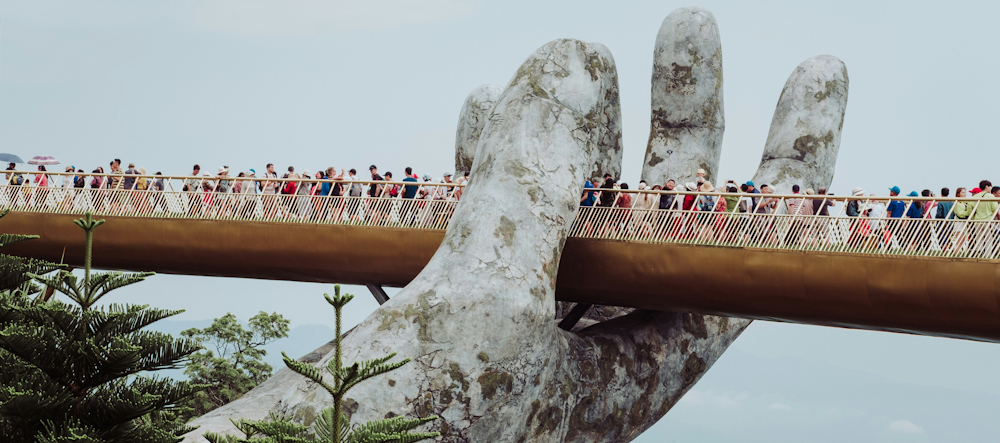
+ PRO: Healthy and diverse food options
Foodies will love tasting authentic Vietnamese cooking and are sure to appreciate how easy it is to eat healthily, thanks to the many vegetable-based dishes. From tasty noodle fare to spring rolls, dumplings and pho – traditional Vietnamese soup – you’ll never be short on meal options, whether home cooked, street food or eating out at a restaurant. You can also find a range of cuisines from many cultures around the world. People in Vietnam are hospitable and will happily invite you to eat with them.
+ PRO: Lots of things to see and do
There is much to see and do in Vietnam, and locals are always keen to take a newcomer on all sorts of adventures. New arrivals interested in learning about the rich cultural heritage can visit the many museums and Buddhist pagodas or temples. The country’s natural attractions are well worth visiting, from boating on the Mekong Delta and tropical beaches to Ban Gioc Waterfall as well as Hang Sơn Đoòng, the world’s largest natural cave.
+ PRO: Welcoming expat community and social integration
You’ll find Vietnam surprisingly welcoming for foreigners, and 85 percent of expats report feeling welcome in the country – well above the global average. Making local friends proves easier than in many destinations. The growing expat community in major cities provides a strong support network, while Vietnamese locals are generally curious and friendly towards newcomers, making social integration more manageable than you might expect.
- CON: Major language barriers
New arrivals may find it difficult to integrate into their new environment without speaking or understanding Vietnamese, especially in more rural areas. Vietnamese is a tonal language, so how a word is pronounced can greatly change its meaning, and getting the right tone takes practice. Language learning resources remain more limited compared to other popular expat destinations. We recommend you familiarise yourself with basic greetings and phrases; a little goes a long way.
- CON: Little personal space and privacy
Limited personal space and privacy are common elements of culture shock in Vietnam for Western arrivals. Vietnamese locals tend to physically position themselves close to the person they are talking to. Conversation topics can be quite direct and seem like prying into your private life when, in reality, people may just be curious and want to be friendly and get to know you. This culture of closeness can make someone unfamiliar with Vietnamese customs feel uncomfortable.
Healthcare in Vietnam
+ PRO: Private healthcare offers good standards
The Vietnamese private medical system offers good facilities (mainly in the cities) and surpasses those of the public healthcare system in Vietnam. Private healthcare professionals and doctors are often from the USA, South Korea, Japan, France as well as Vietnam; all are well-trained and experienced, and their diverse backgrounds also help reduce language barriers. Health insurance coverage has reached about 90 percent of the population, making healthcare more accessible than in many regional neighbours.
- CON: Pharmacies may not stock all medications
While pharmacies are relatively well stocked in Vietnam and finding common prescription medicine is not too hard, not all medicines, vitamins and minerals are readily available.
- CON: Serious air pollution concerns in major cities
Living in a major city such as Hanoi or Ho Chi Minh City comes with severe air pollution problems that have worsened significantly. Hanoi topped global pollution rankings in early 2025 with dangerously unhealthy air quality levels. The government has ordered both cities to improve air quality to safe levels within five years, recognising the severity of the issue. Air pollution has major health implications and is a push factor for many, especially children, older people and those with pre-existing health conditions.
- CON: Mosquito-related diseases remain prevalent
Mosquito-borne diseases are a year-round concern in Vietnam, with dengue fever being the primary threat. While malaria risk is now limited to specific rural areas, dengue transmission occurs throughout the year, with peaks during the rainy season.
Health risks aside, the annoying buzz of mosquitoes and their itchy bites are a negative aspect of life in Vietnam. We suggest you take the necessary precautions against mosquito bites and consider vaccination where available.
Healthcare and Medical Insurance in Vietnam
Weather in Vietnam

+ PRO: Warm weather
If you aren't a fan of winter, you’ll enjoy the warm weather in Vietnam, and residents don’t need to worry too much about layering up in colder seasons. While this is a pro for many, there is a catch: the high humidity. Be prepared for the humid climate, which can make things feel uncomfortably hotter than they are and can be unpleasant.
- CON: Unpredictable extreme weather and flooding
The weather in Vietnam is becoming increasingly unpredictable due to climate change. The country is vulnerable to typhoons and tropical cyclones, with heavy rains typically arriving between June and September each year, bringing flooding, flash floods and landslides. La Niña conditions are making weather patterns especially erratic, meaning you’ll need to prepare for more frequent extreme weather events and be aware of the serious health implications of floods and heat waves.
Education and schools in Vietnam
- CON: International schools are expensive and competitive
While international school options have expanded significantly, they remain expensive and competitive to enter. The fee range is vast, with some schools costing significantly more than others – differences can reach tens of thousands of dollars annually. Waiting lists are typically long, and application processes must be done well in advance. One of the biggest issues limiting entry to international schools is the high cost: parents must often stretch their budget considerably to ensure a private international education for their children.
+ PRO: Good quality schools with diverse options
The standard of education in Vietnam is high, and there are various options to suit different needs and budgets. Some expat parents with young children may opt for a public school, where the language of instruction is primarily Vietnamese and the costs are low. Private and international schools offer higher standards of schooling, with international schools offering familiar curricula in your home language.
Education and Schools in Vietnam
Best International Schools in Hanoi
Best International Schools in Ho Chi Minh City
Moving to Vietnam
Living in Vietnam as an expat
Moving to Vietnam as an expat puts you in for an adventure on many levels. This Southeast Asian country offers excellent earning potential and a high quality of life, with thousands of miles of beautiful beaches on its eastern border, stunning islands, and vast hilly and mountainous inland areas.
The northern city of Hanoi serves as Vietnam’s capital – a fast-changing metropolis filled with new developments, beautiful lakes, bustling streets, and tens of thousands of motorbikes.
In the south, Ho Chi Minh City (previously Saigon) is Vietnam’s most important economic hub. If you’re relocating to Ho Chi Minh City, you can expect skyscrapers, shopping malls and modern restaurants alongside old French colonial architecture.
Vietnam manages to offer both bustling city energy and laid-back countryside charm. The country will tantalise your senses – possibly overloading them at times, although an island escape is always just a short plane hop or ferry ride away.
Vietnam’s economy is the fastest-growing in the region, and the country boasts a thriving art scene, stunning landscapes, and exceptional cuisine that continues gaining international recognition. Numerous Western restaurants, lively nightlife spots and an active art scene ensure that work becomes merely something that takes place between a multitude of social engagements.
Hanoi City Guide
Ho Chi Minh City Guide
Working in Vietnam
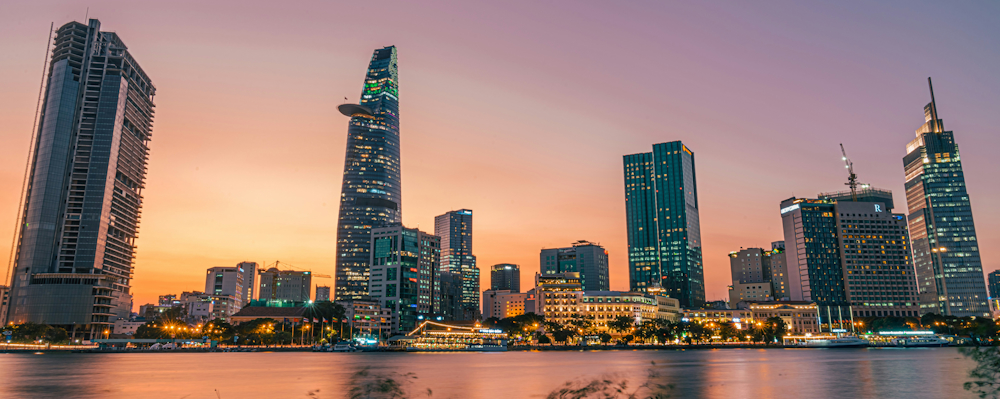
Working in Vietnam offers excellent opportunities in a rapidly growing economy. Vietnam’s workforce reached 53 million people in 2024, with the economy targeting over 8 percent growth in 2025. The job market spans manufacturing, services, and agriculture, with particularly strong demand in the technology, finance, and engineering sectors.
The tech sector stands out for international professionals. You’ll need a work permit for employment longer than three months, which takes approximately 20 days to process. Work permits remain valid for up to two years and must be obtained before starting employment.
Working in Vietnam
Visas for Vietnam
Work Permits for Vietnam
Vietnamese culture
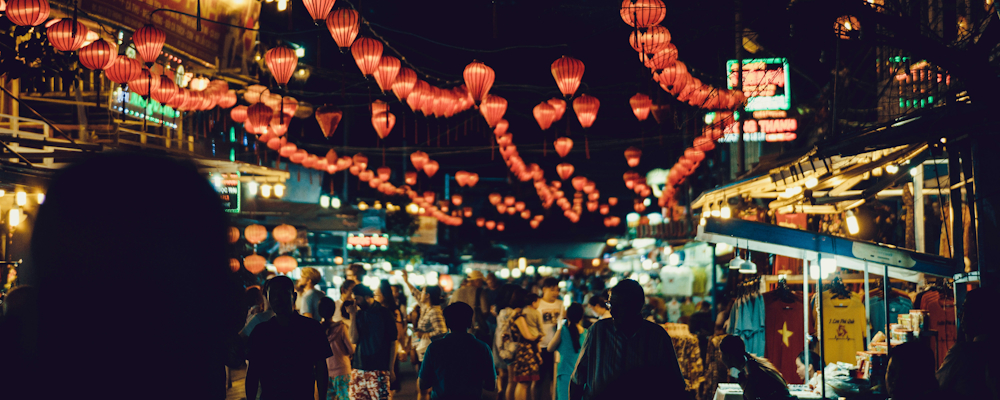
Vietnamese culture centres on respect, hierarchy, and strong community bonds that shape both social and business interactions. Understanding these cultural norms will help you build relationships and succeed professionally in Vietnam. Vietnamese society places enormous value on family connections, respect for elders, and maintaining harmony in group settings.
Business culture in Vietnam emphasises relationship-building over immediate transactions. Communication tends to be indirect and context sensitive, meaning much goes unsaid and non-verbal cues carry significant weight. Hierarchy matters tremendously – always greet older individuals first, show deference to senior colleagues, and avoid public confrontation or causing anyone to lose face.
Key etiquette to remember includes removing shoes when entering homes or temples, dressing modestly (covering shoulders and knees), and using both hands when giving or receiving items.
Local Culture in Vietnam
Doing Business in Vietnam
Finding accommodation in Vietnam
Finding accommodation in Vietnam means choosing between diverse options, from serviced apartments to traditional rentals. Serviced apartments remain the most popular choice for expats, providing furnished units with cleaning services, utilities, and Wi-Fi all included in the rental price.
Popular expat neighbourhoods include District 2 (Thao Dien) and District 7 (Phu My Hung) in Ho Chi Minh City, which is known for international schools and expat amenities. In Hanoi, the districts of Ba Dinh, Tay Ho, and Tu Liem attract international residents. Da Nang has emerged as an attractive alternative. The My An and My Khe beach areas also offer modern serviced apartments.
Cost of living in Vietnam
The cost of living in Vietnam ranks as one of the country’s biggest drawcards, and the country is considered one of the most affordable for expats. Everything from accommodation, transport and groceries is relatively affordable, although this depends on the lifestyle you choose to live. In a recent survey, an impressive 86 percent of expats rated Vietnam’s cost of living positively – more than double the global average – with 65 percent reporting overall financial satisfaction.
Luxury housing and Western food will set you back considerably more than standard accommodation and local cuisine. One of the biggest costs you’ll need to budget for is health insurance, and if you have children, international school tuition fees will also require significant financial planning.
Cost of Living in Vietnam
Transport and Driving in Vietnam
Living in Vietnam with children
Living in Vietnam with children means you’ll need to consider healthcare and education carefully. The healthcare system has improved significantly, with about 95 percent of the population covered by health insurance. Since public healthcare facilities generally don’t match standards found in most Western countries, expats and their families typically invest in extensive international health insurance that covers treatment at private hospitals.
Vietnam is widely considered very safe for families with children, and you’ll have plenty to see and do with your little ones during weekend breaks – from Mekong Delta canoe tours and island hopping to discovering the country’s rich historical sites.
Healthcare in Vietnam
Safety in Vietnam
Finding a school in Vietnam
Finding a school in Vietnam is straightforward if you know where to look. If you’re moving to Vietnam with children, you’ll be pleased to discover numerous international schools throughout the country that cater specifically for expat children’s needs. These schools offer excellent teaching standards and allow students to participate in various extracurricular activities.
Education and Schools in Vietnam
Getting around in Vietnam
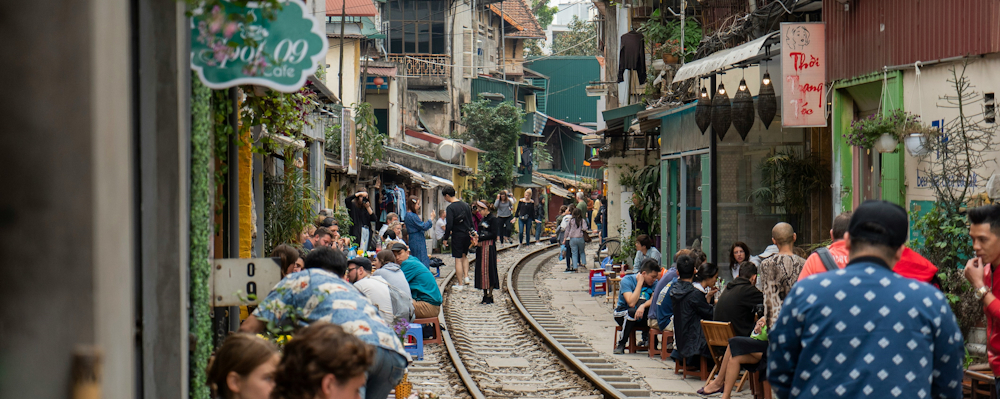
Getting around in Vietnam has become increasingly convenient with modern transport infrastructure and technology-based solutions. Major cities now feature metro systems, with Ho Chi Minh City’s Line 1 launching in 2024, connecting Ben Thanh Market to the Eastern Bus Terminal. Hanoi operates two metro lines, providing efficient public transport across the capital.
Ride-sharing apps like Grab and Gojek dominate urban transport in Vietnam, offering both car and motorbike options with fixed pricing that prevents tourist scams. Motorbike taxis, known locally as xe om, provide the most economical (and sometimes terrifying) city transport.
For longer distances, Vietnam provides efficient train connections, particularly the popular overnight routes from Hanoi to Sapa and the north-south railway linking Hanoi to Ho Chi Minh City. Buses cover nearly every destination at budget-friendly prices, and domestic flights connect major cities quickly. Most expats use ride-sharing apps for daily transport and switch to trains or flights for longer journeys.
Public Transport and Driving in Vietnam
Climate and weather in Vietnam
The weather in Vietnam is warm and tropical year round, although regional variations and seasonal patterns significantly affect different areas. Vietnam experiences two main monsoon seasons: the southwest monsoon from May to October brings wet conditions, and the northeast monsoon from November to April makes for drier weather. However, climate patterns vary considerably from north to south across the country’s 16 degrees of latitude.
Northern Vietnam around Hanoi sees the most seasonal variation, with cooler winters ranging from 59°F to 72°F (15°C to 22°C) and hot, humid summers from 82°F to 95°F (28°C to 35°C). Central Vietnam, including Da Nang, maintains more consistent year-round temperatures of about 68°F to 91°F (20°C to 33°C) but experiences distinct wet and dry periods. Southern Vietnam around Ho Chi Minh City stays consistently warm at about 77°F to 91°F (25°C to 33°C) with less temperature variation, although it still has clear wet and dry seasons.
Humidity regularly reaches 80 percent during wet seasons, which can feel overwhelming initially, but it will become more manageable as you acclimate.
Weather and Climate Charts for Vietnam
Fast facts
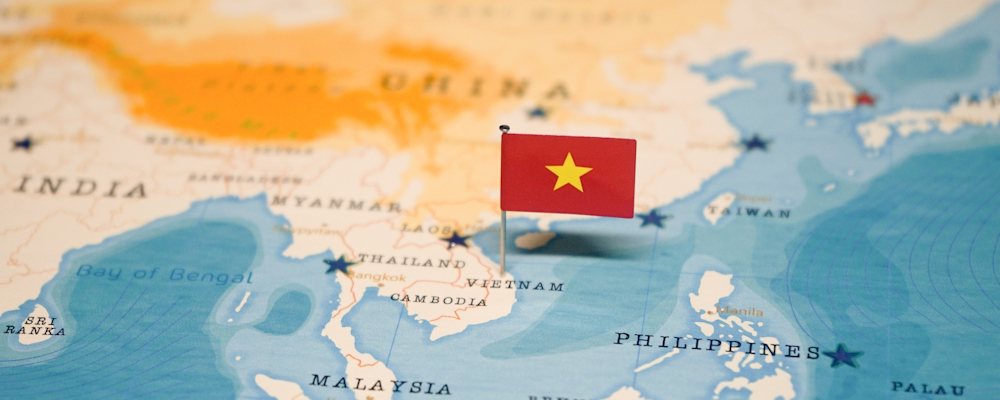
Population: More than 101 million
Capital city: Hanoi
Neighbouring countries: Vietnam is bordered by China to the north and Cambodia and Laos to the west.
Geography: Vietnam is a long, narrow, S-shaped country on the eastern Indochina Peninsula. Most of its landscape is mountainous and densely forested.
Political system: Single-party socialist republic
Major religions: Vietnamese folk religion and Buddhism
Main languages: Vietnamese (official), Chinese, some English and French
Time: GMT+7
Electricity: 220V, 50Hz. Vietnam uses three plug types: Type A (American-style with two flat parallel pins), Type C (European-style with two round pins), and Type D (Indian-style with three round pins). Type C is most commonly used in modern buildings.
Money: The Vietnamese Dong (VND) is the official currency. The US Dollar (USD) is often used for large amounts. Although credit cards are accepted in major centres, Vietnam remains a largely cash-based society.
International dialling code: +84
Internet domain: .vn
Emergency numbers: 113 (police), 115 (ambulance), 114 (fire). Emergency services are extremely limited in rural areas.
Transport and driving: Cars drive on the right-hand side. Motorbikes and bicycles are two of the most popular modes of transport among the locals. Expats often find driving to be risky in Vietnam and avoid driving their own vehicle, especially in the bigger cities, where it’s possible to get around quite easily with public transport.
Diversity and Inclusion in Vietnam
Understanding diversity and inclusion in Vietnam matters enormously for international professionals, and the reality varies dramatically between major cities and rural provinces. Traditional attitudes still hold considerable sway, although significant changes are taking place in accessibility rights, gender equality, and LGBTQ+ acceptance.
For expats weighing up Vietnam as a destination, these social dynamics affect both their career prospects and daily life. You’ll find a country where women dominate certain leadership roles and parental leave policies outstrip many Western nations, but where workplace hierarchies and cultural expectations can be quite surprising.
Accessibility in Vietnam
Accessibility in Vietnam is a mixed picture for the country’s 6.2 million people living with disabilities. The country has experienced limited access to education and employment opportunities, particularly in rural areas.
In recent years, the government has worked closely with UNICEF, USAID and the International Labour Organisation to promote a more inclusive society, aligning it with the UN Convention on the Rights of Persons with Disabilities. It has implemented initiatives and adopted legislation to raise awareness and increase standards in the training, employment, allowances, education, and healthcare of people living with disabilities. Access remains challenging, but there are steady improvements.
Airports
More than half of Vietnam’s airports have now upgraded their accessibility infrastructure. Most international flights arrive at Tan Son Nhat, Ho Chi Minh City’s airport, while Hanoi is accessed via Noi Bai. Both have relatively modern facilities but can become congested during peak times. Assistance for travellers with limited mobility varies considerably and works best when you arrange it in advance with your airline.
Taxis
Most taxis can accommodate a folding wheelchair in the boot, but very few have ramps or space for fixed or powered mobility aids. Mai Linh and Vinasun are popular services that prove safer and more reliable than many independent street cabs, offering pre-booking services for fully accessible vehicles. Regional alternatives to Uber include Grab, Be and Go Viet, helping you avoid hidden costs or circuitous journeys.
Buses
Ho Chi Minh City offers accessible buses with low-floor ramps and designated seating areas for wheelchair users. Most buses elsewhere aren’t accessible to wheelchair users, and boarding and alighting on busy streets and uneven pavements can prove challenging. For most people with any form of impairment (including sight or hearing), buses outside the main cities aren’t a very practical option.
Rail
Hanoi has a relatively efficient overground and underground rapid transit service, while Ho Chi Minh’s metro is partially operational, with much of it under construction and nearing completion. It’s a major programme set to ease the congestion of a city that’s home to well over 9 million people. Both networks were designed to international standards for accessibility.
Car hire
International car hire firms and local franchises are available, although few expats and tourists choose to drive themselves. Car and driver services prove more practical and safer than testing your driving skills on Vietnam’s congested streets. During much of the day, traffic in Ho Chi Minh City and Hanoi crawls along, so well-planned taxi or train travel tends to be your best bet.
Further reading
Aus4Transport: Accessible Public Transport Network
VNAH: Inclusion Of The Vietnamese With Disabilities
LGBTQ+ in Vietnam
LGBTQ+ life in Vietnam shows encouraging progress. The country ranks fourth among Southeast Asian countries for LGBTQ+ equality with a score of 50 out of 100, behind Thailand, the Philippines, and Timor-Leste, but ahead of Singapore and other regional neighbours.
Homosexuality is legal and generally accepted, especially in the expat communities of Hanoi and Ho Chi Minh City. Some people from more traditional backgrounds may still discriminate.
Same-sex marriages aren’t legally recognised. Transgender individuals can legally change their legal gender after undergoing sex reassignment surgery, and since 2024, can update their ID cards during the transition process.
Viet Pride marches take place in Hanoi and Ho Chi Minh City, and gay characters appear in mainstream television and films, but many Vietnamese people are socially conservative. Public displays of affection might draw disapproving glares, but the same holds true for straight couples.
Further reading
Human Rights Watch: Vietnam Adopts Global LGBT Health Standard
Equaldex: LGBT Rights In Vietnam
Gender equality in Vietnam
Gender equality in Vietnam shows mixed progress across different areas. While Vietnamese women have achieved parity in education and make up 49 percent of the country's workforce, with a relatively high labour force participation rate of 63 percent, workplace inequality persists. Society continues to assign women most unpaid care work, and women earn significantly less than men in similar roles.
Women own 21 percent of small and medium enterprises, but gender inequality remains high in larger organisations. A gender pay gap of approximately 14 percent persists. Vietnam offers among Southeast Asia's most generous parental leave policies, with six months (180 days) of maternity leave at full salary, plus five to 14 days of paid paternity leave.
Further reading
Vietnam Briefing: Female Workers In Vietnam Legal Rights And Gender Equality
UN Women: Country Gender Equality Profile Vietnam
GSO: Gender Equality In Labor And Access To Management Work
Women in leadership in Vietnam
Women in leadership in Vietnam occupy strong positions in certain sectors while facing other barriers. For Vietnamese women, success means more than a career. Female leaders need to be champions of the double burden of their roles at home and work.
While society celebrates female leaders, they are subject to many traditional norms set by the remnants of Confucianism and contemporary standards. Women hold 33 percent of senior management positions, slightly below the ASEAN average of 38 percent but above the Asia-Pacific average of 31 percent.
As the economy shifts from agriculture to manufacturing and technology, more female leaders are visible. They are also well represented on People’s Committees in local, regional and national government. The government targets having women in leadership roles in 70 percent of state management agencies by 2030.
Further reading
Grant Thornton: Women In Business 2025 Vietnam
Investing In Women: Vietnam
UN: Voices From Vietnam Invest In Women Accelerate Progress
Mental health in Vietnam
There have been several modern healthcare developments in mental health in Vietnam alongside some persisting traditional beliefs. In Vietnamese culture, mental and physical health are seen as interconnected and viewed as a state of balance. Traditionally, mental health issues have been seen as shameful or a burden.
The mental healthcare system is improving through policy and legislation, including the National Mental Health Strategy 2015–2025 and the National Plan for Prevention and Control of Mental Health Disorders 2022–2025. The government aims for 40 percent of people to receive periodic mental health screening by 2025, rising to 60 percent by 2030.
Since the pandemic, many multilingual national and international resources have become available online to support those suffering from stress, depression and anxiety.
Further reading
EUAA: Medical Country Information Vietnam Psychiatry
World Bank: Human Resources For Mental Health Service Delivery
Unconscious bias in Vietnam
Unconscious bias in Vietnam stems from deeply ingrained social attitudes and historical perspectives. These prejudices, absorbed when living in unequal societies, create barriers around gender, age and ethnicity that inhibit effective hiring, limit development and lower staff morale.
Some international organisations operating in Vietnam use training programmes to promote tolerance and understanding, but entrenched views on gender roles persist. Ageism has emerged as a key diversity and inclusion concern in Vietnamese workplaces.
Diversification of the workforce in Vietnam
The topic of workforce diversification in Vietnam reflects the country’s cultural richness and economic realities. Vietnam is statistically the most culturally diverse country in Southeast Asia, and it's also host to over 100 thousand international workers. Within the population of around 102 million, the government recognises 54 ethnic groups, the vast majority (85 percent) being Kinh (Viet).
The 15 percent of the population that belongs to minority ethnic groups is mainly concentrated in the mountainous and rural regions, and this has led to an ethnic wage gap of around 6.5 percent. Only 6 percent of ethnic minority adults have vocational or tertiary education, compared to 20 percent of Kinh adults.
Further reading
Vietnam Briefing: Insights Into The Vietnam Workforce 2024
UN: Vietnam Common Country Analysis 2024 Update
Safety in Vietnam
Safety in Vietnam presents a reassuring picture for expats and international professionals. The country ranks as a generally safe place to live, travel and work, sitting 41st out of 163 countries in the 2024 Global Peace Index.
Most incidents you’ll encounter are petty crimes such as pickpocketing, centred on tourist attractions and markets. Traffic poses the biggest threat to safety and well-being, with motorcycles involved in the vast majority of road crashes. The country has 74 million motorcycles, more than the adult population, making up over 90 percent of all vehicles.
Vietnam consistently ranks as one of the safest destinations for solo female travellers and expat workers. While most women in Vietnam dress modestly, there are no clothing restrictions except for sacred sites such as pagodas and churches. Harassment and sexual violence are low and uncommon.
Further reading
Economics And Peace: Global Peace Index 2024 (PDF)
WHO: Global Motorcycle Safety Experts In Vietnam
Vietnam News: Safety Measures As Motorbikes Remain Dominant Transport
US State Department: Vietnam Travel Advisory
Calendar initiatives in Vietnam
4 February – World Cancer Day
March – TB Awareness Month
8 March – International Women’s Day
19 May – Global Accessibility Awareness Day
June – Pride Month
10 September – World Suicide Prevention Day
October – Breast Cancer Awareness Month
10 October –World Mental Health Day
14 November – World Diabetes Day
1 December – World AIDS Day
Banking, Money and Taxes in Vietnam
Managing your banking and finances in Vietnam is relatively straightforward, with a modern banking infrastructure that boasts a 98 percent digital transaction rate. You’ll spot ATMs across Vietnamese cities and enjoy internet banking as standard with all accounts.
Bank staff in Vietnam are friendly and ready to help you set up an account. Many expats opt to maintain an account with one of the numerous international banks that operate in Vietnam, especially if they already bank with them back home.
Money in Vietnam
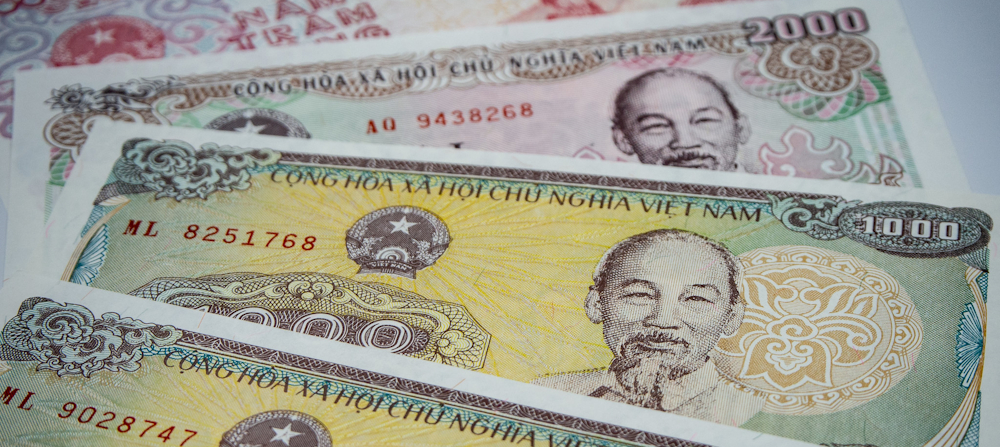
When handling money in Vietnam, you’ll need to know that the official currency is the Vietnamese Dong (VND). It comes in the following denominations:
- Notes: VND 10,000, VND 20,000, VND 50,000, VND 100,000, VND 200,000 and VND 500,000
- Coins: VND 200, VND 500, VND 1,000, VND 2,000 and VND 5,000
US Dollars (USD) are accepted in major cities and tourist hotspots, and many prices are quoted in dollars rather than dong.
Banking in Vietnam
The banking system in Vietnam offers modern and efficient services for both locals and expats. Most banks employ at least one English-speaking representative, with more multilingual staff available in expat-heavy areas.
Several international banks operate in Vietnamese cities, including HSBC, Citibank, Shinhan Bank, Standard Chartered and ANZ. Many expats choose these banks if they already hold accounts with them in their home country. The local Vietnamese banks BIDV, Vietcombank and Techcombank rank as popular choices among the expat community.
Banks across Vietnam offer various banking packages, so it’s worth your time to research which options best suit your needs. Banking hours run Monday to Friday from 8am to 11am and from 1pm to 5pm, although specific times may vary between banks.
Opening a bank account
Opening a bank account in Vietnam requires your passport, a copy of your employment contract, and an initial deposit – the exact amount differs between banks. Some institutions request a letter from your landlord confirming you’re legally renting property in Vietnam. Most banks simply need a valid contact address and your work address.
After setting up your account, you can activate internet and mobile banking services, a recommended step for managing your finances without having to visit branches in person.
Credit cards and ATMs
ATMs are plentiful in Vietnamese cities but scarce in rural areas and smaller towns. When travelling to off-the-beaten-track locations, carry enough cash to cover your expenses.
Vietnam remains largely a cash-based economy, so keep cash on hand for most transactions, even as digital payments are gaining popularity in urban centres. When using ATMs, expect fees between 30,000 VND and 55,000 VND per transaction. For fee-free withdrawals, seek out TPBank and VPBank ATMs, which cater well to international cardholders.
Taxes in Vietnam
Tax regulations in Vietnam classify you as a tax resident if you stay in the country for 183 days (six months) or more during a 12-month period, hold permanent residency, or rent a home long-term. This status makes you liable for progressive income tax rates based on your earnings.
For tax residents, the Vietnamese tax system applies progressive rates that start at 5 percent for lower brackets and climb to 35 percent for the highest income levels. These rates apply to your worldwide income once you qualify as a resident. Those who don’t meet these residency criteria pay a flat 20 percent tax rate on all Vietnam-sourced income.
Given the complexity of Vietnam’s tax system, most expats benefit from consulting with a qualified tax specialist.
Useful links
Healthcare in Vietnam
Healthcare in Vietnam features both Eastern and Western medical approaches. The country is making steady progress toward universal health coverage, and over 90 percent of the population has health insurance. Despite this advancement, many Vietnamese citizens still face out-of-pocket expenses at both private and public facilities. Locals who can afford it typically choose private hospitals for their superior equipment and service quality.
You will need to take out solid private health insurance before you travel to Vietnam. This will cover you for treatment at private healthcare establishments, which offer the standard of care most expats expect.
Public hospitals in Vietnam

Public hospitals in Vietnam generally fall short of the standards you’d expect in North America or Western Europe. These facilities often struggle with underfunding and limited equipment, while doctors and medical staff typically speak only Vietnamese.
Healthcare quality dips dramatically in rural areas, becoming almost non-existent in the most remote regions. The situation is improving thanks to some international organisations’ healthcare investments in Vietnam’s rural areas.
Private hospitals in Vietnam
Private hospitals in Vietnam offer excellent standards of care. These facilities employ doctors from the USA, Korea, Japan, France, among others, alongside Vietnamese physicians who are trained overseas.
You’ll likely find private hospitals cater to your needs much better than public ones, and they typically accept international health insurance. Vietnam has over 350 private hospitals, with the highest concentration in Hanoi and Ho Chi Minh City.
Specialist costs for dentists and dermatologists vary widely. Although prices run lower than in Western countries, specialists targeting the expat market charge more than those serving locals.
English-speaking doctors and staff at private hospitals can help navigate the language barrier. Most expats report high satisfaction with private healthcare facilities, particularly those with JCI accreditation, which signals their adherence to international quality standards.
Health insurance in Vietnam

Most expats secure international health insurance before arriving in Vietnam. When using hospitals, double-check with both the facility and your insurance provider to confirm your treatment coverage.
Make sure your health insurance policy also covers treatment outside Vietnam, as expats often travel to Thailand or Singapore for specialist care and medical emergencies.
Many employers in Vietnam include health insurance in their benefits packages. Be aware of any limitations in employer-provided insurance and consider adding supplemental coverage if it’s needed. Group plans may cost less but might not cover all medical situations you might face.
Pharmacies and medication in Vietnam

Pharmacies in Vietnam are plentiful and well-stocked, particularly in cities like Hanoi and Ho Chi Minh City. Look for shopfronts displaying ‘Nhà Thuốc’ signs, often marked with a green cross or a mortar and pestle symbol. They line most shopping streets and populate malls throughout urban areas.
Buying medicine without prescriptions is straightforward, but beware of counterfeit or expired medications. Always check the expiry dates on packaging before purchase. For added safety, bring essential medicines from your home country or visit pharmacies attached to private hospitals and clinics.
Bringing prescription medicines into Vietnam shouldn’t cause any headaches. Carry a copy of your prescription and a doctor’s letter confirming the medication is for personal use.
Recent changes to Vietnam’s pharmacy laws aim to tighten control over drug prices and improve pharmaceutical regulations. New rules around online drug sales and prescription requirements are being implemented to combat counterfeit medications.
Health hazards in Vietnam
Health hazards in Vietnam pose minimal risks if you take basic precautions during your stay.
Stick to bottled water rather than drinking from taps. Restaurant ice in Vietnam is typically made with boiled water, but those with sensitive stomachs should skip ice in their drinks as a precaution.
The Vietnamese climate brings serious risks of sunburn, sunstroke and dehydration. The heat can be intense, so apply high-UV protection sunscreen daily, even on cloudy days.
Air pollution ranks as a major concern in Vietnamese cities, particularly Hanoi, which sometimes records alarming Air Quality Index readings. If you have asthma or allergies, pack appropriate medication and consider wearing masks on high-pollution days.
Hepatitis A and B can spread in rural areas where hygiene standards may be inconsistent. While malaria cases have plummeted in Vietnam, dengue fever is more prevalent, especially in the Mekong Delta and Ho Chi Minh City. If you’re heading to rural areas, take proper precautions against mosquito bites by using repellent and wearing long sleeves during peak biting times.
Vaccinations in Vietnam
Vaccinations in Vietnam should be planned well in advance of your trip. Contact your doctor at least five to eight weeks before departure to allow time for multiple-dose vaccines. Keep your vaccination records handy while travelling, as border control may request them.
Common jabs for Vietnam include hepatitis A and B, typhoid, tetanus, and Japanese encephalitis if you’ll spend time in rural areas. The US Centers for Disease Control and Prevention (CDC) now recommends the Chikungunya vaccine for travellers who are 65 years or older (especially those with underlying health conditions), those spending at least two weeks in mosquito-prevalent areas, or anyone staying in Vietnam for six months or longer.
Covid-19 vaccinations aren’t required for entry, but they’re still recommended. Consider a rabies pre-exposure vaccination if you’ll work with animals or spend extended time in rural areas where post-exposure treatment access might be limited.
Useful links
Emergency services in Vietnam
Emergency services in Vietnam can be reached by dialling 115. Ho Chi Minh City now offers a privatised 24/7 Emergency Medical Response Service (9999) as an alternative to the official 115 service, with quicker response times and better-equipped ambulances.
Ambulance response times often disappoint, especially in traffic-heavy urban areas. Paramedics rarely speak English, and equipment frequently falls below international standards.
Private hospitals in major cities offer faster and better-equipped ambulance services with English-speaking staff. Despite this, many expats find that taxis or ride-sharing services like Grab get them to private hospitals faster when their condition allows for private transport.
Your international health insurance provider should supply you with a list of recommended hospitals and emergency contacts. Save these numbers in your phone before an emergency strikes, and keep a list of any allergies or medical conditions in both English and Vietnamese if possible.
Working in Vietnam
With an ever-expanding economy, the range of jobs available for those working in Vietnam is also growing. The majority of jobs for foreigners are in Ho Chi Minh City and Hanoi, but some can be found in smaller towns and emerging industrial hubs like Thanh Hoa.
You’ll find most opportunities in Vietnam in the IT, construction and tourism sectors, with technology, renewable energy, and logistics seeing rapid growth. A large English teaching community and many NGOs are also operating out of Vietnam, particularly in Hanoi.
Job market in Vietnam
The job market in Vietnam features a relatively low unemployment rate, with most Vietnamese people working in the agricultural and service sectors. Many others are employed in Vietnam’s manufacturing industries, such as machine building, food processing and the country’s famous garment and shoe production industry.
Expats working in Vietnam typically relocate to take up high-level managerial positions or as young people moving to Vietnam on a short-term basis to teach English or volunteer. Most companies will offer expats relocation packages of some sort; however, the type of package will often reflect your skill level as well as your ability to negotiate.
Salaries in Vietnam are lower than in other large expat locations, although the cost of living in Vietnam is also lower, meaning that you’ll often maintain the same quality of life as in your home country.
Finding a job in Vietnam

Finding a job in Vietnam can be done online through company websites, job portals and recruitment agencies. Word of mouth from fellow expats online can also be a good source of leads. Expats typically move to Vietnam with a job already in hand.
While it’s possible to find a job within Vietnam, the government continues to implement stricter visa regulations. You must have a valid work permit if you intend to work in Vietnam, which your employer will need to submit on your behalf.
Learning to speak basic Vietnamese will put you in good standing with colleagues and associates and enhance your ability to make the most of your spare time when exploring Vietnam and interacting with the local people.
Work Permits For Vietnam
Visas And Residence Permits For Vietnam
Useful links
- TopCV: Leading Job Portal
- VietnamWorks: Employment Opportunities
- CareerViet: Job Listings
- ViecLam24h: Job Search Platform
- ViecLamTot: Career Opportunities
Work culture in Vietnam
When working in Vietnam, you’ll find that the work environment is similar to that of other Asian countries such as China, South Korea and Japan. The Vietnamese have a healthy work ethic and are hard-working and industrious. Offices are formal environments, and you’re expected to dress and behave appropriately. Networking is incredibly important in Vietnam, and you’ll soon find that a broad social group is important when it comes to securing a position or moving up the ladder.
Communal lunches are a critical part of working in Vietnam, as is socialising with colleagues after work. These social occasions also provide good opportunities for expats to connect and interact with their Vietnamese counterparts.
Companies in Vietnam have a very hierarchical structure. This hierarchy is reflected even in meeting seating arrangements, where the boss sits in the middle with staff to the left and right in descending order of seniority. You’re expected to show respect towards your seniors in the workplace. Punctuality is valued, and lateness is seldom tolerated. Make sure to arrive early for meetings or interviews.
Work Permits for Vietnam
If you’re unfamiliar with work permits for Vietnam, you need only speak to a fellow expat working in the country to learn that applying for and obtaining this crucial document can be a complicated affair. The government frequently updates requirements, making the Vietnamese work permit system tricky for newcomers.
Types of work permits for Vietnam
Vietnam sorts work permits into three categories based on your qualifications and job role. Under current regulations, these include permits for experts, managers or executives, and technical workers.
- For the expert category, you need professional experience that matches your job position. Recent rules have eased up – your degree no longer needs to match your position directly, just your experience does.
- If you’re after a manager or executive permit, you’ll need proof of management experience in your field.
- Technical workers must show appropriate vocational training and work experience.
A handy change: your old work permit can now prove your eligibility as an expert or technical worker, smoothing the path for those who’ve worked in Vietnam before.
When it comes to visas, you’ll deal with LD visas in two flavours: LD1 for those eligible for a work permit exemption (valid up to two years) and LD2 for those needing a standard work permit (also valid up to two years). Once your paperwork’s sorted, you can apply for a temporary residence card valid for two to 10 years, depending on your visa type.
Work permit exemptions
In several situations, you might qualify to work in Vietnam without the standard work permit. Exemptions apply if you’re a manager, executive, expert or technical worker staying less than 30 days (up to three times yearly). You’ll still need a work permit exemption certificate, valid for up to two years and serving the same purpose.
Other exemption paths include intra-company transfers within businesses operating in specific sectors (business, communication, construction, distribution, education, finance, healthcare, tourism, and transport), lawyers with Vietnamese practice certificates, foreigners married to Vietnamese citizens, and managers of educational institutions set up by foreign diplomatic agencies. With an exemption, you’ll get an LD1 visa and can use your certificate to apply for a temporary residence card.
Follow the rules carefully – working without proper paperwork results in hefty fines and possible deportation, and employers hiring foreigners without correct documentation face stiff penalties too.
Applying for a work permit for Vietnam
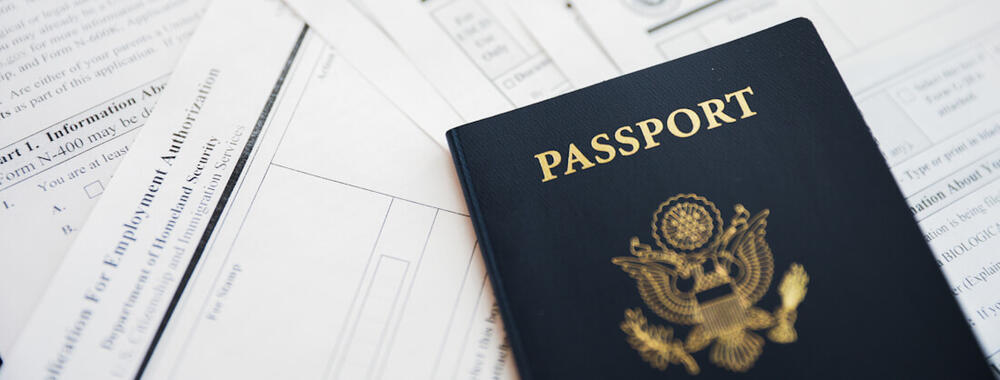
You can apply for a work permit in Vietnam from within the country or abroad with your employer’s help or through a visa agency. Current rules require a multistep process, with employers first gaining approval to hire foreign labour before submitting the actual permit application. Since 2024, employers must also post an expat's job on the Ministry of Labour’s online portal 15 days before applying for their work permit.
If applying from inside Vietnam, you’ll typically enter on an e-visa (valid up to 90 days) and then secure your work permit. To qualify, you must be at least 18, in good health, and have a clean criminal record. You’ll gather various documents – health certificate, criminal background check, copies of ID, passport and qualifications. These need translation into Vietnamese and proper notarisation. Whether to notarise in Vietnam or your home country is an open question, but most people get their documents notarised at home and then legalised by Vietnamese authorities upon arrival.
While the government claims processing takes 10 to 15 working days after submission, reality tells a different story. The full process from documents to permit typically takes six to eight weeks, and that’s assuming you’ve submitted everything correctly. Start the application at least 30 days before you want to begin work to avoid delays.
Useful links
Extending your work permit in Vietnam
Extending your work permit in Vietnam is straightforward if you’re staying in the same job. Vietnamese labour laws require your employer to apply for a permit between five and 45 days before your current permit expires. Your permit must still be valid when applying. The process mirrors your initial application, but your renewed permit comes through faster, typically within five working days after submitting a complete application.
Work permits last up to two years and can only be extended once for another two years. This applies across all categories – managers, experts and technical workers. After your extension runs out, if you wish to continue working in Vietnam, you’ll need a brand-new application rather than another extension. Worth keeping in mind for your long-term plans.
Useful links
Visa and work permit regulations are subject to change at short notice, and you should contact your nearest Vietnamese embassy or consulate for the latest information.
Local culture in Vietnam
The local culture in Vietnam presents different values and customs from the West, which can take some getting used to when you first arrive. Expect at least some culture shock as you settle in. A calm approach to Vietnam’s chaotic aspects will serve you well. Friendliness, openness, and eagerness to learn about Vietnamese culture will make your expat experience more rewarding.
Having an open mind and a sense of humour will help reduce culture shock in Vietnam. Expat surveys show that over four in five newcomers feel welcome in the country, and Vietnam ranks among the top destinations for ease of settling in.
Attitude towards foreigners in Vietnam
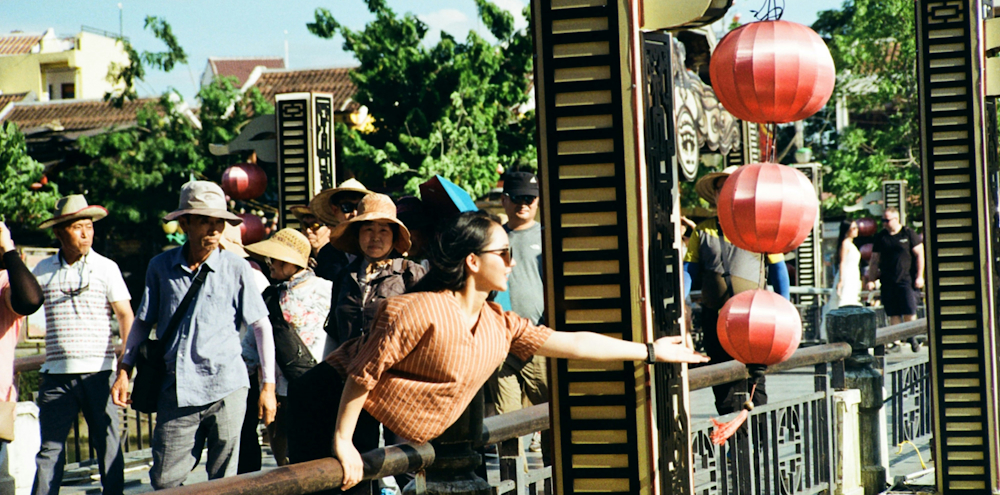
When living in Vietnam, you’ll notice a marked difference in how Vietnamese co-workers treat you compared to market vendors and touts. Vietnam draws many tourists, so at times, locals might perceive you as just another visitor. Once you venture beyond tourist hotspots though, you’ll discover the authentic Vietnam, its people and culture.
The people that expats interact with daily at work are typically warm, welcoming and ready to help. Vietnamese colleagues value harmony in work settings and rarely show anger, contributing to a more relaxed atmosphere than in many Western offices.
Politics in Vietnam
You’ll quickly learn that Vietnamese people take great pride in their country, so avoid mentioning the painful history of the Vietnam War. Learning about Vietnam’s national history and holiday traditions will help you connect with locals.
Steer clear of sensitive political topics in public spaces. Focus on safe conversation topics like family, food (especially regional dishes), travel destinations within Vietnam, and sports (football is hugely popular).
The concept of ‘face’ matters greatly in Vietnamese culture – maintaining respectful conversations helps preserve good relationships and shows cultural awareness.
Language barrier in Vietnam
The language barrier in Vietnam can be challenging, but speaking Vietnamese isn’t always essential for workplace success. Learning a few basic phrases will serve you well in social situations.
Although Vietnamese isn’t the simplest language to master, even basic lessons will help you read signs and manage daily interactions, particularly with pronouncing names and places.
Vietnamese people appreciate it when you make an effort to speak their language. Simple phrases like ‘Xin chào’ (hello) and ‘Cảm ơn’ (thank you) open many doors. Remember that Vietnamese is tonal – the same word can mean different things depending on pitch, so practice your pronunciation.
City life in Vietnam
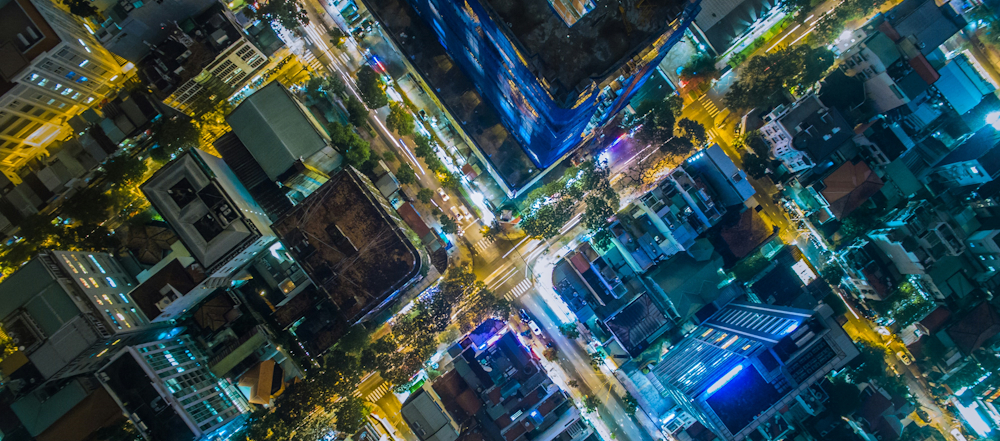
Expats who relocate to Vietnam will likely land in the bustling energy of Ho Chi Minh City or Hanoi. At first, the non-stop activity of Vietnamese city life might feel overwhelming. Life amid the street vendors, travellers and motorbikes brings a lot of excitement but also noise.
You may become the focus of unwanted attention from vendors, curious onlookers and children. Accept this attention and learn to tune it out. Most foreigners eventually get used to the comments and blend into their surroundings.
Market vendors often assume Westerners have deep pockets, so expect higher prices than locals pay for the same goods. That being said, never accept the first price offered. When shopping at Vietnamese markets, bargaining is expected. To haggle effectively, stay friendly, maintain a smile, and start at about 40 percent of the asking price.
Popular expat areas include Thao Dien (District 2) in Ho Chi Minh City and Tay Ho in Hanoi, where you’ll find more Western amenities and fellow English speakers.
Best Places to Live in Ho Chi Minh City
Road safety and transport in Vietnam
Road safety in Vietnam presents major challenges. You’ll need to navigate numerous transport options while staying alert. Buses and trains get incredibly crowded, as do the roads during rush hours. Staying safe on the roads requires constant awareness of your surroundings.
Learning to cross streets filled with motorbikes, cars and bicycles is essential. Picture the traffic as a school of fish and cross slowly without sudden movements. This helps drivers predict where you’ll go and adjust accordingly. New laws now require pedestrians to signal with their hands when crossing roads without traffic lights or crosswalks, with fines for non-compliance.
If you choose to ride a motorbike, always wear a helmet, stay on the right side, and use your horn often.
Transport and Driving in Vietnam
Safety in Vietnam
LGBTQ+ in Vietnam
LGBTQ+ rights in Vietnam have advanced in recent years. Same-sex activities are legal, and in 2022, the health ministry officially declared that being gay or transgender is not a medical condition. The 2015 civil code allows transgender individuals to change their legal name and gender. Currently, there are ongoing efforts to develop more comprehensive gender-affirmation laws that would make the process more straightforward.
While society grows more accepting, public displays of affection face disapproval for all couples, regardless of their orientation. LGBTQ+ expats will find more established communities and social venues in Ho Chi Minh City and Hanoi, as rural areas are more traditional.
For day-to-day life, discretion serves you better in public spaces and workplaces, especially outside major cities. Dating apps like Grindr and Tinder work throughout Vietnam, although many users are discreet about their identities.
LGBTQ+, Diversity and Inclusion in Vietnam
Women in Vietnam
Expat women in Vietnam will encounter a society with distinctive gender dynamics. Vietnam shows higher female workforce participation than many neighbouring countries, but traditional gender roles still shape daily life, especially in rural settings.
In professional environments, expat women typically receive respectful treatment. Recent initiatives like the Gender Equality and Returns project aim to improve workplace equality across Vietnam, but there are still pay differences between men and women in similar roles.
Street harassment in Vietnam occurs less frequently than in many Western countries, but you should still follow standard safety measures, particularly after dark. For personal safety, using reputable taxi services like Grab rather than motorcycle taxis at night is advisable.
Despite these challenges, female solo travellers and expats make their way around Vietnam safely, with most sharing positive experiences throughout the country.
Accommodation in Vietnam
Renting expat accommodation in Vietnam is generally straightforward, but the process does require some planning and patience. Some expats have accommodation provided for them as part of their employment package, but most need to make their own arrangements.
It’s unwise to commit to a rental contract without viewing the property first. Many newcomers book temporary accommodation like serviced apartments or guesthouses when they first arrive in Vietnam, giving themselves time to explore neighbourhoods and find suitable long-term housing.
Due to Vietnam’s property ownership restrictions for foreigners and the often temporary nature of assignments, most people who relocate to Vietnam choose to rent rather than buy property.
Types of accommodation in Vietnam
The types of accommodation in Vietnam vary significantly depending on location and budget. Vietnam’s residential property market has shown tremendous growth, and apartment sales have surged as new developments reshape the skylines of major cities.
In Hanoi and Ho Chi Minh City, you’ll find modern high-rise apartments, luxury condominiums, and serviced apartments that meet international standards. The market offers everything from compact studio apartments to spacious three-bedroom units, with many developments featuring amenities like swimming pools, gyms, and 24-hour security.
Beyond traditional apartments, Vietnam offers unique property types, including officetel apartments (multi-functional spaces combining residential and office areas) and sky villa apartments (larger units on upper floors with terrace access).
Outside the city centres, you’ll discover more traditional housing options, including standalone houses, villas, and older apartment complexes. Suburban areas typically offer more space and often better value, although the trade-off is usually a longer commute to business districts.
Furnished vs unfurnished
Most rental properties in Vietnam come fully furnished, which is particularly convenient for international residents who don’t want the hassle of purchasing furniture and appliances. Furnished apartments typically include basic furniture, kitchen appliances, air conditioning, and sometimes even bedding and kitchenware.
What is meant by ‘fully furnished’ can vary, so it’s worth clarifying exactly what’s included. Unfurnished properties are less common but may offer better value for long-term residents who prefer to personalise their living space. These properties usually come completely empty, sometimes without even basic fixtures.
Short lets
Short-term accommodation in Vietnam has faced significant regulatory changes. As of 2024, Ho Chi Minh City has banned short-term rentals in residential apartment buildings. The new Housing Law reinforces these restrictions by classifying daily or hourly rentals as hotel operations requiring proper licensing.
Under current regulations, only condotels (tourist-specific developments) and certain mixed-use complexes can legally offer short-term rentals. For temporary housing while you search for permanent accommodation, consider serviced apartments, extended-stay hotels, or monthly rental options through legitimate accommodation providers. These typically fall outside the short-term rental restrictions and offer more reliable, legal alternatives.
Useful links
Finding accommodation in Vietnam

Most people find accommodation in Vietnam through online property portals, social media groups, real estate agents, and word-of-mouth recommendations from colleagues and other residents.
Property websites such as Batdongsan.com.vn (Vietnam’s largest property portal), Alonhadat.com.vn, and Cafeland.vn offer extensive listings across different price ranges. Many of these sites include English-language options for international residents.
Real estate agents can be extremely helpful, especially if you don’t speak Vietnamese. They have access to properties that may not be publicly advertised and can negotiate lease terms on your behalf. In Vietnam, tenants typically don’t pay brokerage fees, as these are usually covered by the landlord.
Some people moving to Vietnam will be fortunate enough to have a relocation company working on their behalf, who will assess their preferences and shortlist properties for them to view, making the entire process much smoother.
When viewing properties, particularly in Ho Chi Minh City, take a walk around the surrounding area to check for construction activity. Vietnam’s booming construction industry means building development is common, and major infrastructure projects like the recently opened metro system continue to transform urban environments. Construction noise can be significant, especially on weekend mornings when you might prefer a quiet lie-in.
Useful links
Renting accommodation in Vietnam

Making an application
When applying to rent in Vietnam, you’ll need to provide a copy of your passport, work permit (or relevant visa), and your employer’s address. Vietnamese law requires both tenants and landlords to report rental agreements to local ward or district police within 24 hours of signing, so this documentation is mandatory.
Some landlords may also request proof of income or an employment contract, particularly for higher-end properties. The application process is generally straightforward, although having a Vietnamese-speaking contact or agent can help smooth any communication issues.
Leases
Standard lease terms in Vietnam typically range from one to three years, with one-year minimums being the most common. Rent prices are fixed for the duration of the contract, and many lease agreements are written in both Vietnamese and English.
Rent can be paid monthly or quarterly, with some landlords preferring quarterly payments in advance. The lease should clearly outline payment schedules, maintenance responsibilities, security deposit terms, and conditions for renewal or early termination.
Deposits
Security deposits typically range from one to three months’ rent. Apartments usually require one month’s deposit, while condominiums may need two months. This deposit covers potential damages and unpaid rent.
Ensure the lease agreement clearly states the conditions under which your deposit will be returned and what deductions might be made. Take photos of the property’s condition when you move in to avoid disputes later.
Terminating the lease
Early lease termination requires at least 30 days written notice to your landlord unless your contract specifies different terms. Breaking a lease early may result in forfeiting part or all of your security deposit, depending on the circumstances and your contract’s specific termination clauses.
If you need to leave before your lease expires, discuss options with your landlord early. Some may be willing to negotiate, particularly if you can help find a replacement tenant.
Utilities in Vietnam
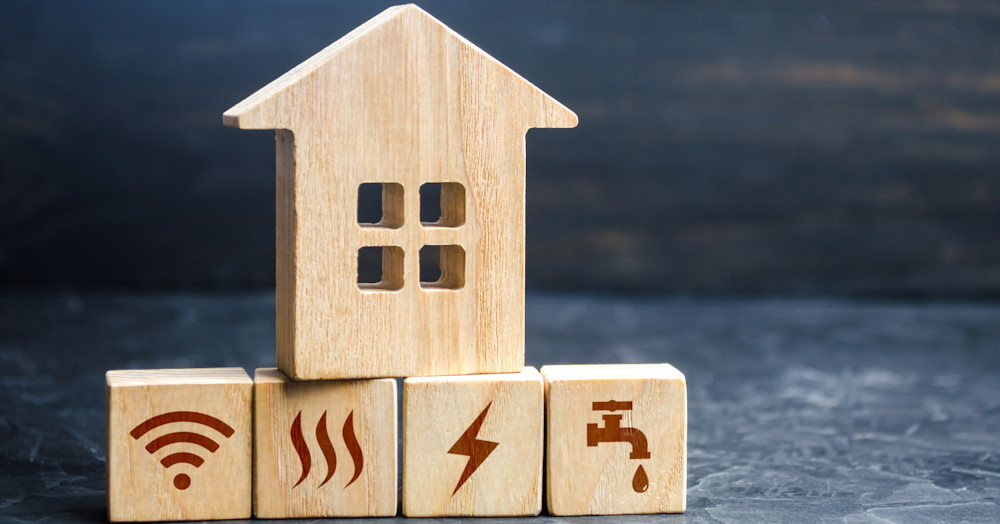
You’ll need to budget for monthly utility costs in Vietnam, which are generally quite affordable compared to Western standards. Those living in apartment buildings may also need to pay a management fee covering cleaning, maintenance, security, and building staff salaries.
Electricity
Vietnam Electricity (EVN) is the country’s sole electricity provider, operating as a state-owned monopoly regulated by the Ministry of Industry and Trade. For rental properties, landlords typically handle the initial setup and account management, with costs either included in rent or billed separately to tenants.
Vietnam’s electricity comes primarily from coal (almost 60 percent of output), although renewable sources like solar and wind are rapidly expanding and contributed 12 percent of generation in 2024. The power supply is largely reliable.
Most residential customers currently pay a single rate, although EVN is trialling a two-tier pricing system. You can pay electricity bills through bank transfers, mobile banking apps, or cash payments at EVN offices.
Gas
Liquefied petroleum gas (LPG) is widely used in Vietnam, primarily for cooking, with annual production reaching over 764,000 tons. Given Vietnam’s tropical climate, gas heating systems are uncommon.
Major providers include Petrolimex and other petroleum companies. Gas is typically supplied through refillable cylinders that can be exchanged at local suppliers.
Water
While major cities like Hanoi and Ho Chi Minh City have municipal water systems, tap water is not considered safe to drink directly. Water sources include major rivers like the Dong Nai and Saigon rivers, but ageing infrastructure and other limitations mean the water requires additional treatment.
Most international residents boil tap water, use filtration systems, or rely on bottled water for drinking and cooking. Many households install multi-stage water filters or reverse osmosis systems. Bottled water is widely available and affordable throughout Vietnam.
Water bills are typically very low, but the setup process varies by location. In rental properties, landlords often handle the account setup and billing arrangements.
Bins and recycling
Waste collection in major cities is managed by companies like URENCO (Urban Environment Company). The system typically uses communal containers where residents bring their household waste rather than individual coloured bins for different waste types. Building management fees in apartment complexes usually cover waste collection services.
Recycling systems are developing but aren’t as comprehensive as Western countries. Valuable materials like metal and glass are collected by informal networks of waste pickers.
Internet
Vietnam offers excellent internet services, with fibre-optic connections widely available. The three main providers are VNPT (largest market share), Viettel, and FPT Telecom. Many providers offer package deals that include television services.
Vietnam’s internet infrastructure is modern and reliable, with average speeds comparable to those in developed countries. Most providers offer English-language customer service for international residents.
Useful links
Keeping in Touch in Vietnam
Keeping in touch in Vietnam is straightforward and easy. Vietnam’s internet speeds, mobile networks, and digital services have grown impressively in the last years, and you can keep in touch with family and friends back home without breaking the bank. International calls don’t cost an arm and a leg, the postal service works like clockwork in most areas, and high-speed internet access spans most of the country.
Internet in Vietnam
Internet in Vietnam comes through service providers, WiFi hotspots, or internet cafés – take your pick. The digital backbone now stretches toward every corner, with plans for nationwide fibre-optic coverage by 2030. Vietnam is in the global top 20 for mobile connectivity.
Government filters block certain websites and topics, with stricter rules since December 2024. This law also forces social media platforms to pull illegal content within 24 hours, requires your phone number or ID for verification, and makes foreign companies store Vietnamese user data for authorities.
Chat and video apps like Skype, WhatsApp and FaceTime run without a hitch, letting you stay in the loop with folks abroad. As an expat, these restrictions won’t really affect you, although you might notice some international news sites and social platforms go dark occasionally. Many expats use VPNs to sidestep content blocks.
Mobile phones in Vietnam
Mobile phones in Vietnam come with quick setup and wallet-friendly data plans, and there’s fierce competition between providers. Coverage keeps expanding, with 5G networks live across central zones in all 63 provinces. The government aims to cover 99 percent of the population by late 2025.
Your choice of provider matters for your specific needs. Market leader Viettel gives the best rural coverage, while Vinaphone and Mobifone excel in cities. Check whether your provider allows sending and receiving international calls before signing up. You’ll spot prepaid SIM vendors at airports, shopping centres, and mobile shops throughout major cities.
You might need a Vietnamese-speaking friend to help with translation when setting up a contract phone. Expect to provide copies of your passport, visa, proof of residence, workplace details, and employment contract. These checks got tougher in 2024, as phone numbers now link directly to your personal ID.
Postal services in Vietnam
Postal services in Vietnam are now quite high-tech while maintaining reliability for everyday mail. Your home address works fine for receiving mail in cities, as does your workplace. Stick to tracked delivery for anything important – regular mail sometimes gets lost.
Tech upgrades have transformed how parcels move around the country. Viettel Post uses robot vehicles in their Hanoi hub, cutting delivery times by up to 10 hours and processing up to 4 million parcels daily, half of Vietnam’s e-commerce volume. They’ve rolled out delivery drones for hard-to-reach spots and installed 1,000 smart collection boxes across Hanoi and Ho Chi Minh City.
Write addresses clearly on your packages, especially for buildings tucked down Vietnam’s maze-like city alleyways. When sending items, you can choose between old-school postal services, specialised courier firms, or app-based delivery startups. DHL and FedEx operate nationwide for international shipping, offering rock-solid reliability at premium rates.
English-language media in Vietnam
English-language media in Vietnam starts with widely available cable and satellite TV channels from back home. Streaming platforms have taken off, although expats use a VPN workaround to unlock their full libraries.
News junkies can turn to several top-notch English publications. VnExpress International, Vietnam News, Tuoi Tre News, The Saigon Times, and Nhan Dan Online cover Vietnamese affairs from different angles – some more state-aligned than others.
Weather in Vietnam
The weather in Vietnam is generally humid and moderately hot. You’ll experience regional climatic variations, with the northern area being significantly cooler than the central and southern regions. Overall, average temperatures range between 63°F (17°C) and 81°F (27°C), and humidity is usually upward of 80 percent.
Like other Southeast Asian countries, the defining characteristic of Vietnam’s weather is the monsoon, a transitional wind that brings heavy rainfall. The south-easterly monsoon creates a long rainy season between May and October, depending on your location. Outside this period, rainfall is rare and light when it does occur. You’ll find the humidity especially oppressive during the rainy months.
Weather patterns in Vietnam vary dramatically from north to south. In the northern region around Hanoi, you’ll experience a humid subtropical climate with four distinct seasons. Winters (December to February) can be surprisingly cool with temperatures dropping to around 50°F (10°C), while summer temperatures typically range from 82 to 90°F (28 to 32°C). Spring and autumn offer milder temperatures and are often considered the most pleasant times to visit the north.
The central region, including cities like Hue and Da Nang, has hot, dry weather from February to August, with temperatures often reaching above 95°F (35°C) in June and July. The rainy season hits central Vietnam later, with the heaviest downpours between September and December, sometimes bringing typhoons and flooding.
Visas for Vietnam
Visas for Vietnam come with different requirements depending on your nationality. You may be granted visa-free entry into Vietnam or be eligible for a visa on arrival. If you’re from a country not endorsed for either of these, you’ll need to apply for a visa in advance. If you intend to live and work in Vietnam, you’ll need a work permit and a residence permit.
Visit visas for Vietnam
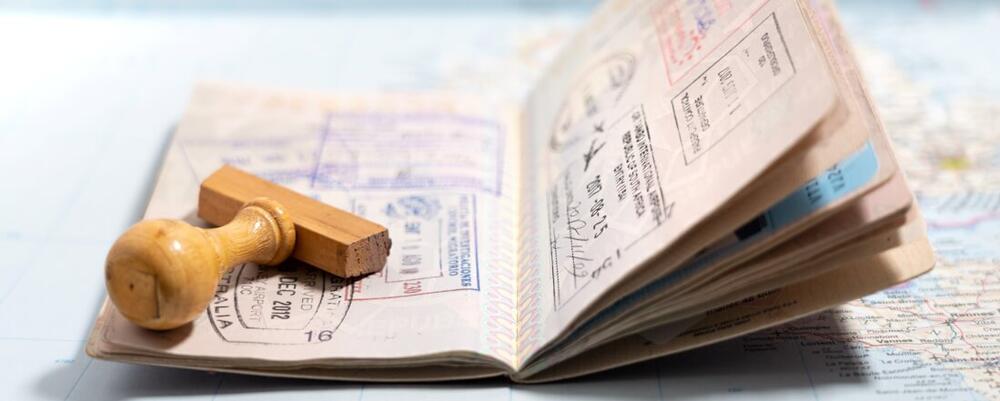
Visit visas for Vietnam come in several forms to suit your travel needs. Vietnam offers e-visas valid for 90 days with multiple entries, giving you the flexibility to hop in and out of the country during this period. If you’re a citizen from one of the 26 visa-exempt countries, you can stay in Vietnam visa-free for between 14 and 90 days, depending on your country of origin.
If you require a visa to enter Vietnam, you can apply for one at your nearest Vietnamese embassy or consulate or make use of the electronic visa system. You can also use these channels if you’re eligible for a visa on arrival for the sake of convenience and efficiency at the border.
Note that some online companies intentionally create the misconception that they are official entities by using .govt or .org web addresses. You should use your local Vietnamese embassy or consulate’s website and only follow legitimate links rather than do a general web search.
Phu Quoc Island offers a special visa exemption policy that allows you to stay for up to 30 days without a visa, regardless of nationality.
Useful links
Residence permits for Vietnam

Residence permits for Vietnam, known as Temporary Residence Cards (TRCs), are your ticket to living and working in the country for an extended period. Having a TRC gives you the freedom to enter and exit Vietnam without applying for a new visa each time. Your TRC remains valid for two to five years, saving you from the hassle of frequent visa renewals. You can apply for a TRC for work, study or business purposes, among others. Close family members of TRC cardholders can apply for their own TRC.
The TRC application process requires form NA8, your valid passport, visa documentation, work permit or equivalent documents, and passport-sized photos. Processing time typically takes five to seven business days after submitting all required paperwork.
You can download the relevant forms from the Vietnam Immigration Department’s website and submit your application at an Immigration Department office in Vietnam.
Useful links
Visa regulations are subject to change at short notice, and you should contact your respective embassy or consulate for the latest details.
Education and Schools in Vietnam
Education and schools in Vietnam have seen significant growth in the private sector in recent years. This stems partly from the country’s expanding expat community. Vietnam ranks among the top five countries globally for international school growth. Several prestigious international schools in Vietnam, particularly in Ho Chi Minh City and Hanoi, offer top-quality education to expat and wealthy Vietnamese families.
Vietnam maintains a high standard of public education, with a literacy rate of 97 percent – among the highest in the Asia-Pacific region, despite its status as a developing country. Schools outside the main urban centres often lack resources, but many international parents in cities opt for the good public schools to avoid the steep costs of international school fees.
Public schools in Vietnam

Public schools in Vietnam operate quite differently from what Western parents might expect. Students in Vietnam typically study quietly and passively, a stark contrast with the interactive learning and class discussions that have become common in Western education. Teachers follow a standardised national curriculum with limited room for creative approaches.
A handful of schools in Ho Chi Minh City have broken away from traditional Vietnamese teaching methods, offering more progressive learning environments. These modern public schools have extremely long waiting lists due to high demand from both locals and expats.
Vietnamese students face intense academic pressure from their families and teachers, and most attend private tutoring after school due to Vietnamese culture’s strong emphasis on academic achievement.
The Vietnamese education system is undergoing major reforms. Vietnam’s 2018 General Education Programme introduced competency-based learning and student-centred teaching. The 2024 academic year marked the final high school graduation exam under the old 2006 programme, with a new assessment system launching in 2025.
Useful links
- Ministry of Education and Training Vietnam
- Department of Education and Training, Ho Chi Minh City
- Vietnam Institute of Educational Sciences
Private and international schools in Vietnam

Private and international schools in Vietnam have flourished remarkably in recent years. Since 2019, international schools have surged by over 40 percent. Most can be found in Hanoi and Ho Chi Minh City, serving both the growing expat population and affluent Vietnamese families seeking global education standards.
Top international schools typically employ native English speakers or teachers trained in the school’s affiliated country. Many schools follow well-regarded curricula such as the British National Curriculum, International Baccalaureate, or the American curriculum.
Popular international schools fill up quickly, with lengthy waiting lists for admission.
Applying for international schools in Vietnam
Applications for international schools remain open throughout the academic year, but spaces at sought-after institutions disappear fast. To improve your chances of securing a place, plan to apply six to 12 months before your intended move.
Many international schools require entrance exams to test your child’s English and maths proficiency. Schools often request interviews with both the parent and their child before making formal offers.
Expect to pay fees in advance or provide non-refundable admission fees for each child. Fee structures vary between schools and typically increase with the child’s age. School bus transport and cafeteria lunches come as additional costs at most private schools. Also budget for uniforms, extracurricular activities, field trips and stationery.
Best International Schools in HCMC
Best International Schools in Hanoi
Special educational needs in Vietnam
The government’s approach toward special educational needs in Vietnam has shifted from division to inclusion over recent decades. The country once separated special-needs students from mainstream education, but since the early 2000s, it has shifted toward integration. The 2010 Law on Persons with Disabilities formally recognises inclusive education as the primary approach for students with disabilities, using separate provisions only when inclusive conditions aren’t feasible.
Vietnam launched the Ramping Up Education For All programme in 2024, focusing on improving inclusive education, particularly for ethnic minority children and those with disabilities. Many private and international schools also offer specialised services tailored to each child’s specific support needs.
Useful links
- Council for Exceptional Children Vietnam
- UNICEF Vietnam – Inclusive Education
- International Association of Special Education – Vietnam
Tutors in Vietnam

Tutors in Vietnam are popular, with more than a third of households making use of them. The industry continues to expand rapidly.
Tutoring options span from subject-specific coaching to language training and exam preparation. STEM subjects (Science, Technology, Engineering, and Mathematics) make up nearly half of all tutoring services, reflecting their importance in the Vietnamese education system. Many parents prefer one-on-one tutoring for its personalised approach tailored to individual learning styles.
Quality tutors can help your children adapt to new curricula when transitioning to Vietnam, bridging any learning gaps as they adjust. Well-regarded tutoring providers include Everest Education, International Tutor Group, and ITS Education Asia.
Useful links
Safety in Vietnam
When it comes to safety in Vietnam, staying aware of key safety issues will ensure a trouble-free experience, although the country is relatively stable and peaceful for expats. The 2025 Global Peace Index placed Vietnam 38th out of 163 countries. Most safety concerns stem from underdeveloped infrastructure and poverty in certain areas, rather than organised crime.
Petty theft in Vietnam
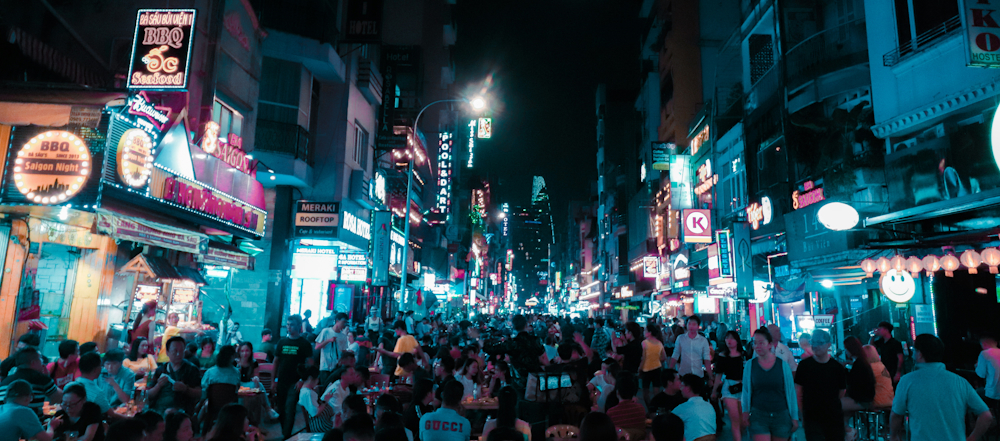
Petty theft poses a risk in Vietnam’s urban areas. Tourists and Western newcomers often fall prey to pickpockets in busy areas of Ho Chi Minh City and Hanoi. Thieves target crowded spots with bag slashing tactics, especially during holiday periods like Tet (Lunar New Year) and Christmas.
Steer clear of secluded areas when alone. Leave flashy jewellery and watches at home, and keep phones and cameras tucked away. Motorcycle snatch-and-grab thieves operate frequently, so hold bags in front of you or away from street traffic. Lock your passport and other vital documents in your hotel safe rather than carrying them.
Watch out at known hotspots: Ben Thanh Market, Binh Tay Market, the Backpackers District (Bui Vien, De Tham, and Pham Ngu Lao Streets), Dong Khoi Street, and the Marble Mountains.
Scams in Vietnam
Scams in Vietnam target fresh arrivals, with tourists and expats facing slick cons from the moment they land. Knowing these tricks helps you dodge unwanted drama and expenses during your stay.
Common scams in Vietnam include:
- Fake charity collectors asking for donations
- Taxi drivers refusing to use meters, then demanding outrageous fares. Always insist on meter use or agree on a price up front to avoid arguments later.
- Strangers offering restaurant or shop recommendations that lead to inflated bills
- Counterfeit Grab taxi operators, especially at airports. Book only through official apps and verify your driver matches the app profile.
- Locals inviting you for ‘authentic’ tea or coffee experiences that end with shocking bills
- Cyclo drivers quoting tiny initial fares before demanding much more at journey’s end
- Shoe shiners who grab your footwear without permission, then charge 10 times the normal rate
- Sellers pretending to have disabilities or using children to hawk fake goods
- Shops selling ‘leather’ items with plastic interiors behind genuine leather fronts
- Massage parlours with bait-and-switch pricing after services are delivered
Safety on transport in Vietnam
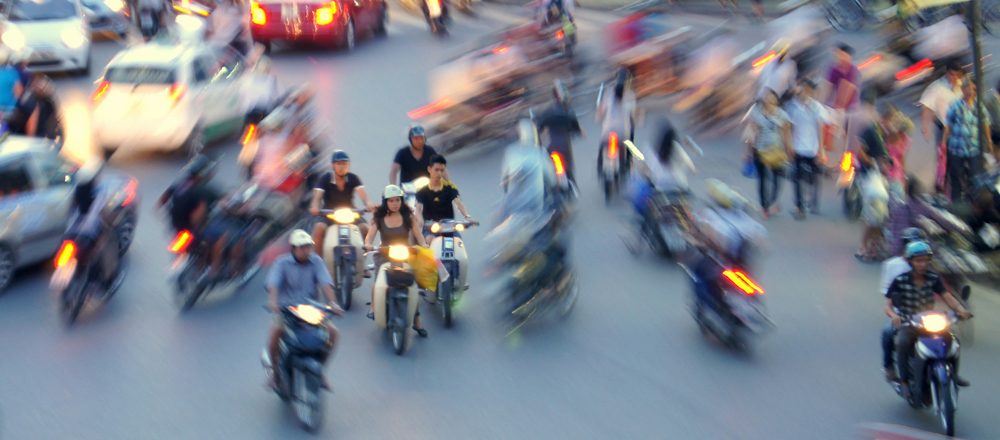
Safety on Vietnam’s roads is a concern, and the country is notorious for road traffic accidents, especially in its urban areas. Try to avoid driving until you become familiar with driving conditions and road etiquette in the country.
Motorbikes are one of Vietnam’s main modes of transport, with over 74 million motorcycles in the country – more than the adult population. While riding a motorbike is the fastest and most efficient way to navigate city streets, it’s also the most dangerous. Motorcycle accidents account for over 60 percent of road crashes in Vietnam. Although it’s illegal to be on a motorcycle without wearing a helmet, compliance rates vary by region, with some estimates showing only about 30 percent proper helmet usage in certain areas.
For safer transport options, consider using reputable ride-sharing apps like Grab (the most popular), GoViet, or Be, or established taxi companies like Mai Linh and Vinasun that have their own booking apps. Pre-booking via apps is generally safer than hailing taxis on the street and provides more reliable and transparent pricing.
Transport and Driving in Vietnam
Natural disasters in Vietnam
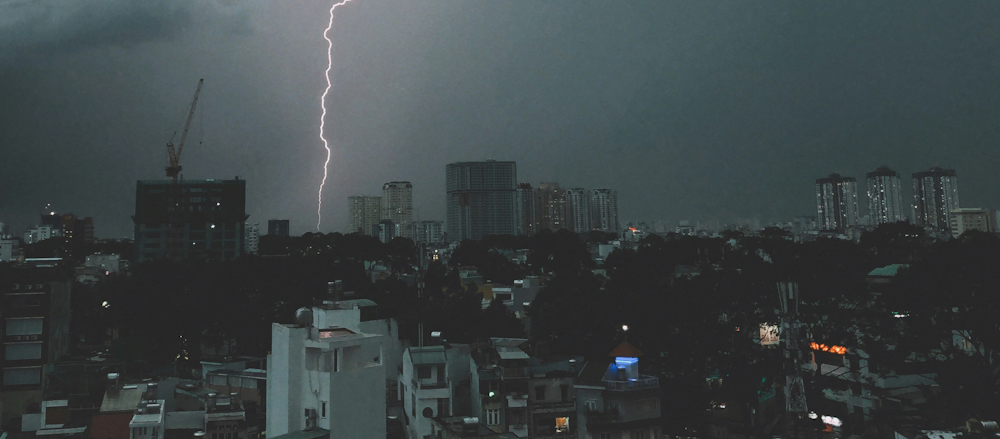
Natural disasters in Vietnam pose a significant risk, particularly during typhoon season, which runs from June through November. Vietnam is prone to typhoons, flooding, and landslides, with recent events demonstrating their destructive potential. In 2024, Super Typhoon Yagi was one of the strongest storms to hit Vietnam in 70 years, causing severe flooding, landslides, and affecting millions of people across northern and central parts of the country.
Keep an eye out for weather alerts during storm season, particularly if travelling to coastal or mountainous regions. Follow evacuation orders when issued by local authorities, and avoid travelling to high-risk areas during severe weather warnings.
Health and environmental concerns in Vietnam
Health and environmental concerns in Vietnam include air pollution, which is a significant issue in urban areas. Short-term exposure to poor air quality can irritate your eyes and throat, and those with underlying cardiorespiratory conditions such as asthma, chronic obstructive pulmonary disease, or heart conditions may experience exacerbated symptoms.
To protect yourself, regularly check the Air Quality Index (AQI) through apps or websites before planning outdoor activities. Consider wearing a well-fitted N95 mask during periods of heavy pollution, especially if you have respiratory conditions. Limit prolonged or strenuous exercise outdoors on heavily polluted days. If possible, use air purifiers in your living space to maintain better indoor air quality.
Transport and Driving in Vietnam
Transport and driving in Vietnam offer many options to get around. In addition to the usual buses and trains, you’ll soon see that the locals love to travel on two wheels, with nearly four out of five Vietnamese owning motorcycles or bicycles. The roads in Vietnam’s cities tend to be congested and chaotic, though. Driving can be stressful, and many expats prefer not to get behind the wheel themselves.
Road traffic accidents occur frequently in Ho Chi Minh City and Hanoi, with studies showing that over 40 percent of motorcycle drivers in major cities experience accidents annually. You should always exercise caution when using Vietnam’s roads and ensure you follow safety regulations. Vietnam recently adopted new traffic safety laws, which took effect in January 2025, bringing stricter enforcement via traffic cameras and harsher penalties for violations.
Public transport in Vietnam
Public transport in Vietnam offers reasonable fares, although it is not always comfortable. Buses and trains create an easy network for travel around the country, and since December 2024, metro services in both Hanoi and Ho Chi Minh City have added modern transit options to the mix.
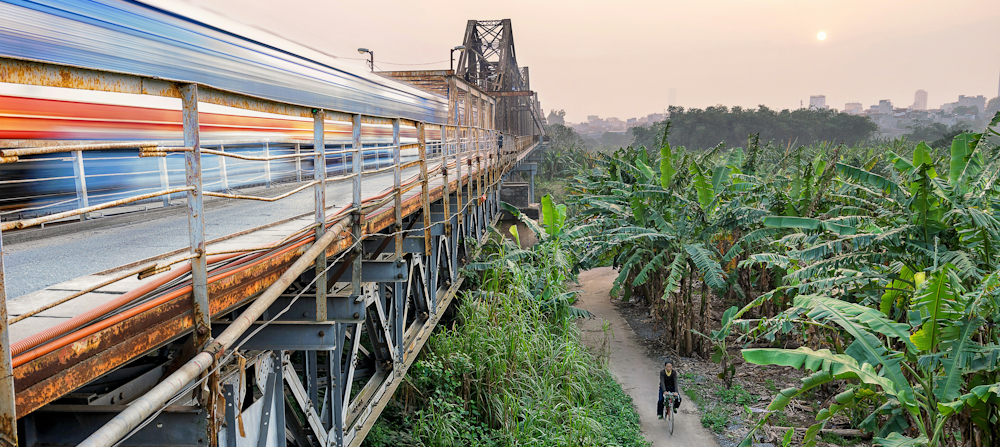
Trains
Trains in Vietnam cost slightly more than buses but provide a much more comfortable overland travel experience.
Vietnam Railways operates the major train line between Hanoi and Ho Chi Minh City. This journey takes over 30 hours, with stops at popular destinations like Hue, Danang, and Nha Trang along the way.
For overnight train travel, you can choose between hard seats, soft seats, hard beds or soft beds. Hard seats come cheapest but are the least comfortable, while soft beds offer the best travel experience.
For the safest and most cost-effective purchase, buy tickets directly at the train station. On popular routes, agents and resellers often buy the best seats in air-conditioned carriages in advance. You might arrive at the station to hear ‘sold out’ but can usually still find tickets from other sources.
Purchase train tickets at least three days ahead to avoid disappointment and agent hassles. Train services become notably busier during holiday seasons. Booking now opens 60 days before departure for long routes, sometimes extending to 90 days for end-to-end journeys.
Watch out for a common scam: private travel agents or station resellers charging for air-conditioned carriage tickets but giving you tickets for non-air-conditioned or lower-class carriages. You typically won’t discover this deception until you’re already onboard with no compensation options.
Buses
Intercity buses are commonly used between Vietnam’s major cities. Most intercity buses are air-conditioned and in good condition, but long journeys can feel uncomfortable. The seats fit the smaller frames of Vietnamese locals, leaving taller Westerners often struggling with cramped conditions and minimal legroom.
Vietnamese bus drivers tend to drop passengers who aren’t travelling to the final destination at convenient crossroads rather than at proper bus terminals. Be prepared for this unexpected practice.
Metro
Ho Chi Minh City launched its first metro line in December 2024, connecting Ben Thanh Market to the Eastern Bus Terminal. The line includes three underground stations (Ben Thanh, Opera House, and Ba Son) and 11 elevated stations.
Trains run from 5am to 10pm, arriving every 8 minutes during peak hours and every 12 minutes during quieter periods.
Ticket prices vary by distance, from shorter journeys to longer trips across the line. Options include daily tickets, three-day tickets, and monthly passes (with student discounts available). Contactless payment users enjoy slight discounts. Bicycles aren’t permitted on board.
Useful links
Motorcycles in Vietnam
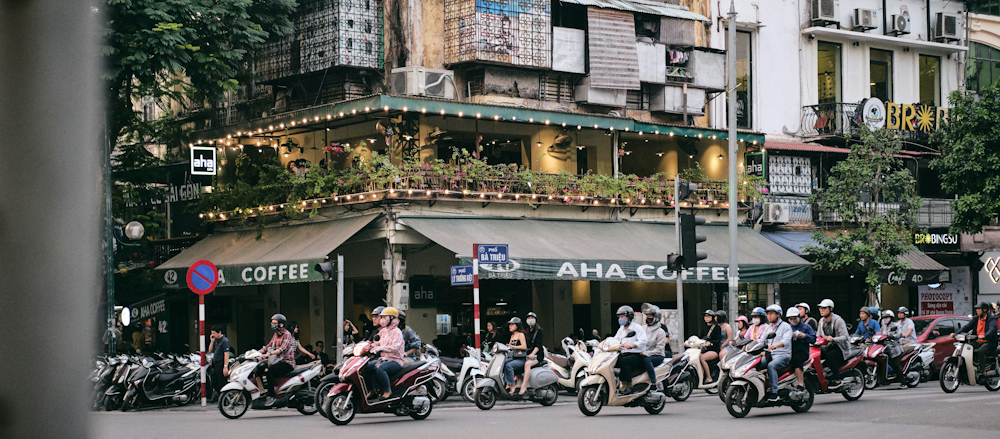
Motorcycles in Vietnam are the most popular mode of transport among locals. Hanoi and Ho Chi Minh City streets swarm with them – nearly 80 million registered motorbikes exist in a country of 98 million people. You’ll commonly spot entire families balanced on a single motorbike.
Vietnamese law requires you to possess a local driver’s licence for any motorbike over 50cc. You must obtain a temporary Vietnamese motorcycle licence to hire or ride a motorcycle in Vietnam. Bikes under 125cc need an A1 licence (most common), while those over 125cc require an A2 licence.
Getting your licence means converting your international driver’s licence and holding a valid residence permit. Many tourists try riding on just their international licence, but this isn’t legal, despite what rental shops might claim.
Riding without a helmet – either as driver or passenger – breaks Vietnamese law. You’ll see many locals ignoring this rule, but you should always wear a helmet for safety and legal protection.
New regulations allow foreign nationals to bring their own motorcycles into Vietnam for tourism. This requires approval from authorities, proper documentation (including technical safety certificates and insurance), and a guiding motorcycle arranged through a Vietnamese travel service. Foreign vehicles may stay a maximum of 30 days.
Taxis in Vietnam
Taxis in Vietnam can be easily hailed in city centres at prices far below Western rates. Reliable local taxi companies include Mai Linh and Vinasun, and ride-hailing apps have revolutionised urban transport across the country.
The ride-hailing sector is booming across Vietnam, growing rapidly each year. Ho Chi Minh City leads as the country’s busiest market, with services now spanning beyond just transport to include food delivery, payment options, and courier services. Recent surveys show Grab dominating with nearly 60 percent of Vietnamese users, followed by Xanh SM (Vietnam’s first electric taxi service) in a strong second position, boasting twice the market share of local competitor Be Group.
Stick with reputable taxi companies and book ahead via phone or online for the safest experience. Motorcycle taxis (xe om) provide another ubiquitous transport option. They’re everywhere and offer a budget-friendly way to navigate Vietnam’s busy streets.
Feel free to negotiate prices for longer trips to outlying areas. Always agree on a fare before starting your journey. Motorcycle taxi drivers frequently try to demand more than the agreed price when you reach your destination, so carry exact change to avoid such disagreements.
Western expats and tourists often face inflated rates, but standing your ground firmly usually results in a fairer price.
Useful links
Driving in Vietnam
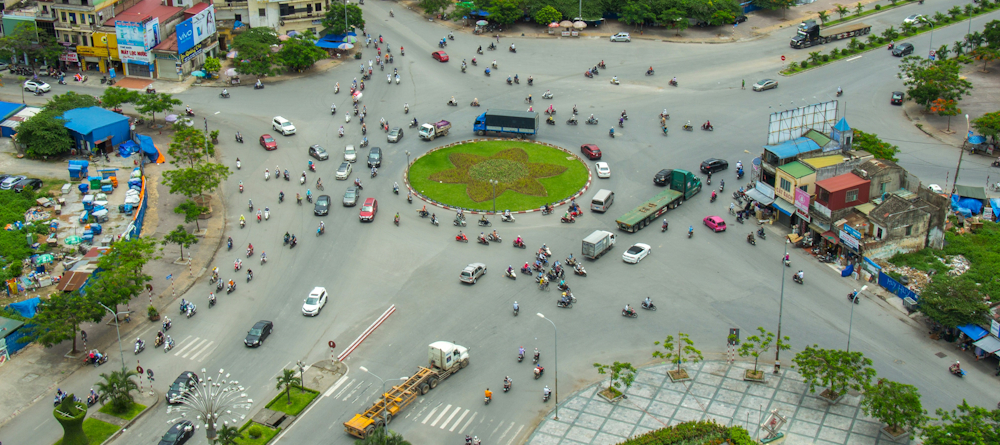
Driving in Vietnam presents challenges that make many expats think twice. Most expats find Vietnamese roads risky and nerve-wracking, leading them to avoid driving altogether, especially in larger cities. Some expats hire drivers instead, sidestepping both the stress of navigating chaotic traffic and the headache of finding parking in urban centres.
The bustling streets of Hanoi and Ho Chi Minh City burst with activity and minimal regard for road rules, particularly among two-wheeled travellers. Traffic jams are a daily frustration, and parking spots come at a premium.
Highway driving brings its own dangers. Should you brave city driving, adopt a defensive approach and learn to anticipate other road users’ movements. Smaller towns and villages offer somewhat easier driving conditions.
Road quality varies widely across regions, with most routes poorly maintained. Watch for potholes when driving or motorcycling. Road signs, while not always clear, will typically display information in both Vietnamese and English.
Driver’s licences
Driving in Vietnam requires both an International Driving Permit (IDP) and your home country’s original driver’s licence. Long-term residents must convert to a Vietnamese licence – a process demanding your foreign licence (with Vietnamese translation), passport, visa, and residence permit.
Tourist visa holders cannot obtain Vietnamese licences – only those with residence cards or long-term visas (six months minimum) qualify. Car hire firms will insist on proper documentation and substantial deposits (typically refundable upon returning undamaged vehicles).
Recent regulations now permit foreign nationals to bring specific vehicles into Vietnam for tourism: passenger cars (right-hand or left-hand drive) with up to eight seats, mobile homes, and two-wheeled motorcycles. Requirements include proper documentation, insurance, and travelling with a guide vehicle arranged through a Vietnamese travel service. Foreign vehicles may stay a maximum of 30 days.
Domestic flights in Vietnam
Domestic flights in Vietnam provide excellent value considering the time they save. The market is split pretty evenly between Vietnam Airlines and VietJet Air, with Bamboo Airways holding a smaller share. Smaller carriers include Vietnam Air Services Company, Pacific Airlines, and Vietravel Airlines.
Flying from Hanoi to Ho Chi Minh City takes just two hours, compared to the gruelling 30+ hour train journey. Regular flights connect other major cities, including Danang, Nha Trang, Phu Quoc, and Hue, giving easy access to Vietnam’s diverse regions and attractions.
Book tickets well ahead for the best fares, especially during holiday seasons. Online booking options abound, with third-party platforms helping you compare flight times and prices easily.
Useful links
Doing Business in Vietnam
Doing business in Vietnam makes for an attractive destination with plenty of opportunities for budding entrepreneurs. The country has a steadily growing economy, which has experienced consistent development in the past few decades and continues to offer significant potential for foreign investors.
In recent years, the country has seen an influx of businesspeople moving to Vietnam to diversify their operations away from China. Vietnam’s population of approximately 100 million people also draws on a large, young and increasingly educated workforce, making it an even more appealing location for expat business ventures. The Vietnamese government has taken steps to amend legislation to encourage foreign business owners to set up enterprises in the country.
Fast facts
Business hours
Monday to Friday, from 8am to 5.30pm, with a one- to two-hour break for lunch around midday.
Business language
The official business language is Vietnamese. English is spoken in virtually all business circles, but it’s worth hiring an interpreter to assist you in dealing with government departments and other service providers.
Business dress
In Vietnam, your business attire should be formal and conservative. Despite the hot weather, it is best to stick to dark-coloured suits.
Greetings
Greetings in Vietnam typically involve handshakes when meeting business associates and usually only take place between members of the same gender. Some Vietnamese people use a two-handed shake, with the left hand on top of the right wrist. If you’re a male greeting a woman, wait for her to extend her hand first. If she does not, don’t insist on a handshake but rather bow your head slightly.
Gifts
Gift-giving in business is fairly common at the end of a business deal or during a meal in honour of a business partnership. Your gifts should be small but not overly expensive. Ideal gifts include something with your company logo on, or something unique to your home country.
Gender equality
Gender equality in Vietnam is steadily improving, with around a third of Vietnamese businesses now led by women. The government has set targets to increase this figure to 50 percent in the coming years. Despite this progress, women remain somewhat underrepresented in certain business sectors and senior corporate positions.
Read more: Women in Leadership in Vietnam
Business culture in Vietnam

Business culture in Vietnam is very hierarchical. You should show respect towards elders and senior figures at all times.
Greeting
When addressing your business colleagues in Vietnam, it’s important to use appropriate titles followed by the person’s given name rather than their family name. When greeting older colleagues, it is best to bow slightly; younger businesspeople will greet each other with a firm handshake.
Relationships and networking
Personal relationships are key to successful business partnerships in Vietnam, so expect to invest a considerable amount of time getting to know your business associates. In fact, it isn’t uncommon for no actual business to be discussed at initial meetings.
Business cards are exchanged at initial meetings and should be presented with both hands. When giving cards to multiple people, present to the most senior person first with a slight bow. When receiving a business card, you should show proper respect for it and not simply glance at it and put it in your pocket.
Networking is essential in Vietnam. Vietnamese businesspeople prefer to work with those recommended by a friend or business contact rather than be approached directly. You’ll soon find that a broad social network does wonders for your business success.
Business negotiations in Vietnam can sometimes be slow. Remember that there is often a lot of red tape that must be contended with when doing business in Vietnam. Furthermore, group consultation can also delay final decisions. Patience is therefore critical when conducting your business in the country.
Saving face
The concept of maintaining ‘face’ is important in Vietnamese business circles. Vietnamese people will go to great lengths to avoid embarrassment (losing face) during business proceedings. Usually, when one person disagrees with another, they will remain quiet to avoid causing a loss of face. Silence is, therefore, a common means of communication in business.
Trust is also important in Vietnam. Business people take each other at their word, and therefore, you should never make promises you cannot keep. Backtracking on an agreement will have a negative impact on your reputation and create difficulty when it comes to future business proceedings.
Timekeeping
The Vietnamese value punctuality. Arriving late or being unprepared for a scheduled meeting is seen as disrespectful. Be sure to plan ahead when doing business in Vietnam. It’s best to arrange meetings far in advance and then confirm the appointment closer to the time.
Dos and don’ts of business in Vietnam
- Do dress conservatively and modestly. Despite the hot weather, Vietnamese businesspeople wear formal business suits.
- Don’t assume your business associates will speak English. While English is widely spoken in business circles, it is recommended that you hire an interpreter to assist you, especially at initial meetings.
- Do present your Vietnamese business associates with a small gift at the end of a successful business deal.
- Don’t backtrack on the terms of a business agreement. Trust is a vital element of business relationships in Vietnam.
- Do have your business cards printed in both English and Vietnamese. This shows respect and preparation for the local business environment.
- Don’t rush business discussions. Building relationships comes before closing deals in the Vietnamese business culture.